
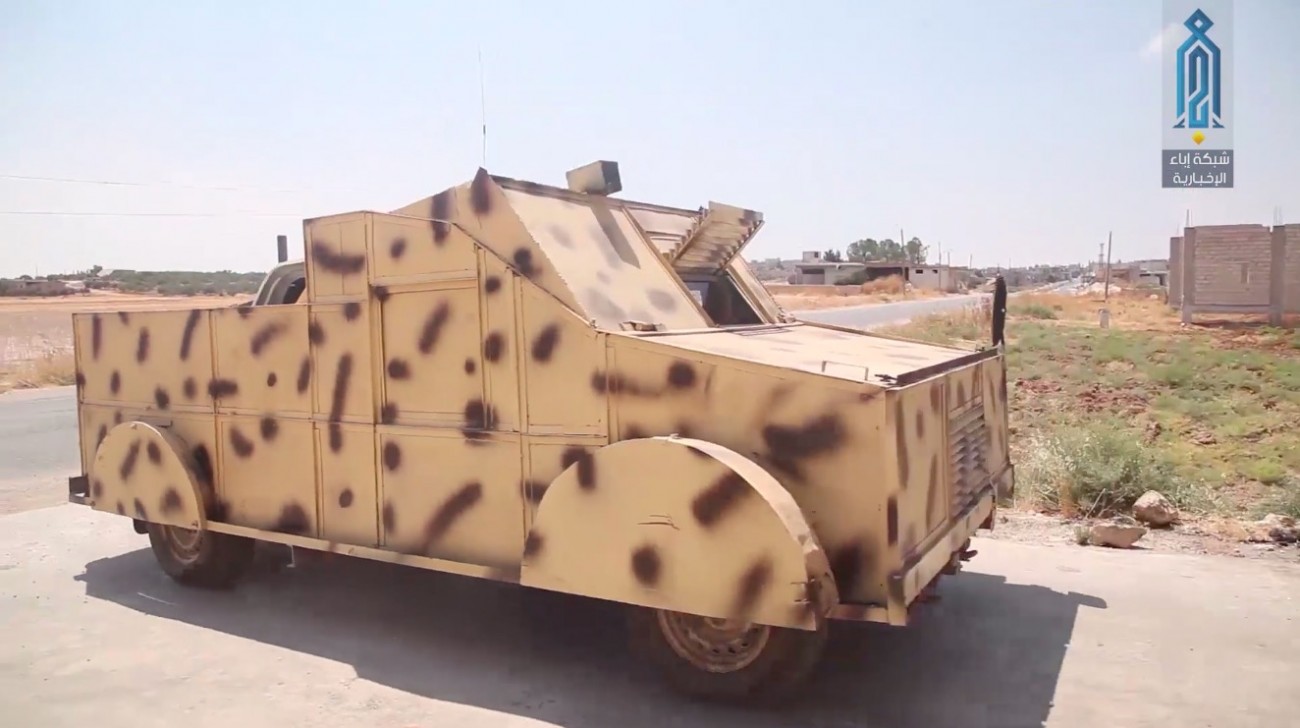
Summary
Since May 2019, a series of Syrian loyalist offensives backed by the Russian air force has gradually encroached upon the country’s northwestern Idlib Province, home to the last major pocket of opposition-held territory. As the chief rebel group in control of Idlib, Hayat Tahrir al-Sham (HTS) has employed dozens of suicide car bombs as part of its continued defense of the area. Formally known as suicide vehicle-born improvised explosive devices (SVBIEDs), these weapons have been a cornerstone of the group’s — and by extension, the entire opposition’s — military strategy since early stages of the war, when rebel forces began capturing and holding territory. In an attempt to further understand this strategy and how it has evolved over time, this case study seeks to compare and contrast HTS’s past and current use of SVBIEDs, with a heavy focus on the latter. It will also examine HTS’s evolving SVBIED design, paying particular attention to technical innovations such as environment-specific paint schemes, drone support teams, tablets with target coordinates, and live camera feeds, as well as upgraded main charges.
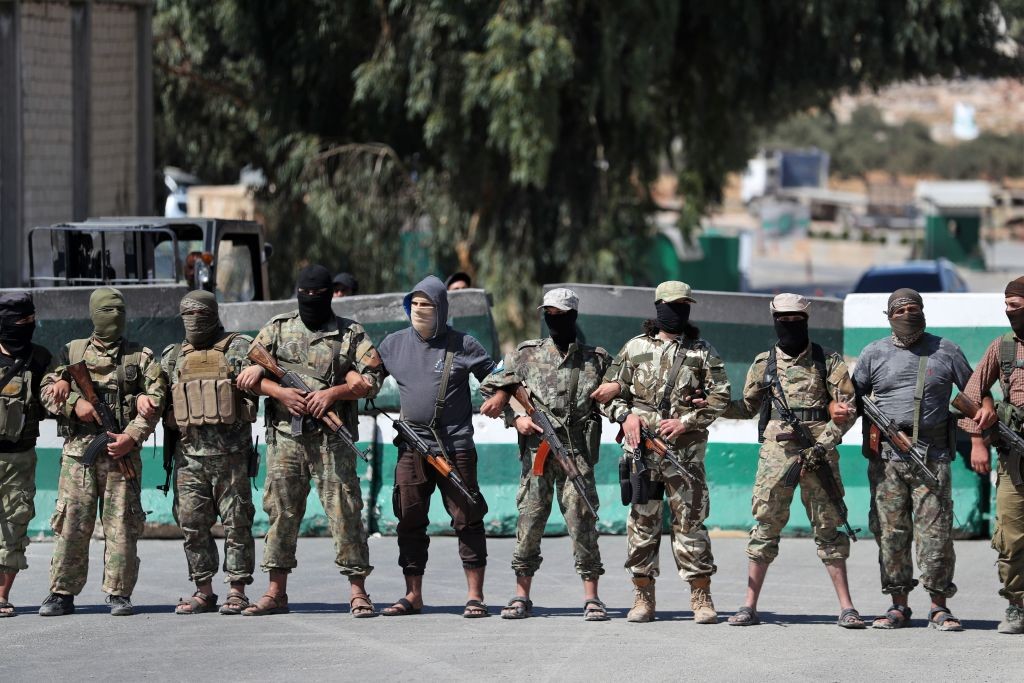
Contents
1. Background
3. Design and Development of Tactics, Techniques,
and Procedures
4. Conclusion
5. Endnotes
Background
In armed conflicts, the balance of power is often skewed one way. This is particularly true when it comes to civil wars, where numerically inferior breakaway factions are pitted against the state and all that it encompasses: a standing army, artillery, tanks, and most crucially, an air force. This disparity of arms, manpower, and technology means that non-state actors are generally at a disadvantage when fighting against the state. To overcome these challenges, nascent insurgencies consistently opt for guerrilla warfare through ambushes, sabotage, hit-and-run attacks, and raids, all of which normally allow smaller units to avoid confronting the might of the state head on. While these methods of attack may wear down regular armed forces over time, they are employed from a position of inferior military strength. One of the only weapons with the ability to bridge the gap in military capabilities between non-state and state actors is the suicide car bomb. Sometimes referred to as “the poor man’s air force,”1 it constitutes the single most powerful weapon at the disposal of most non-state actors.
The use of SVBIEDs has been a cornerstone of the wider Syrian opposition’s military strategy since the beginning of the Syrian civil war in 2011.2 Throughout the conflict, HTS has remained the most prolific user of SVBIEDs among all the disparate opposition factions. However, its use of this powerful weapon has changed dramatically over time and evolved in a continuous attempt to adapt to changing circumstances on the ground.3 The group’s use of SVBIEDs can be roughly divided into three phases, each reflecting specific operational environments.
When HTS first emerged as a serious actor in Syria in 2012, it operated under the name of Jabhat al-Nusra (JaN).4 Beginning in late 2011, the group initiated a campaign of SVBIED attacks against both high-profile state targets in major urban centers and checkpoints and outposts of the Syrian Army in the countryside.5 The SVBIEDs used in this first phase were “covert” in nature, in that they utilized civilian vehicles with unmodified exteriors or seized army vehicles, in an attempt to avoid detection and blend in with their operational surroundings.6 Covert SVBIEDs are the most commonly used type of SVBIED and they have been employed in many parts of the world by a multitude of non-state actors, both past and present.7 The use of this type of SVBIED was logical for a group that lacked territorial control, and allowed JaN to both terrorize government-controlled areas and knock out isolated checkpoints and outposts by approaching their desired targets unnoticed before detonating large quantities of explosives.8
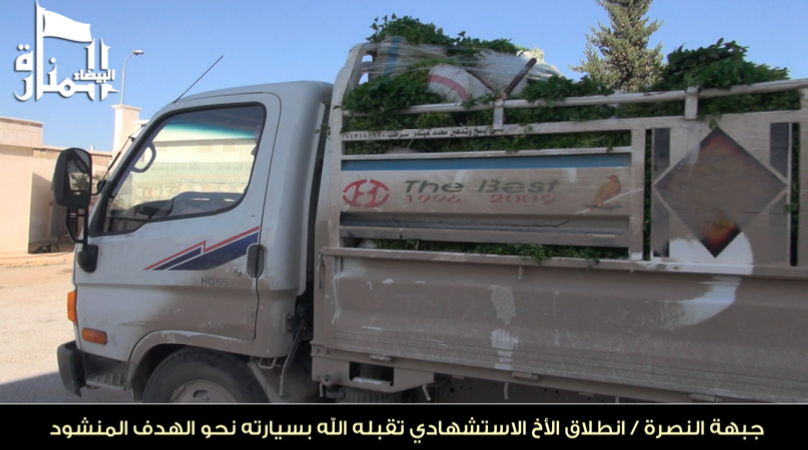
As the opposition started capturing and controlling territory in 2013, they gradually began confronting the Syrian Army in a more conventional manner, employing tanks, armored vehicles, and artillery pieces recently added to their arsenal as a result of their territorial expansion.9 In this new “conventional” operational environment, JaN was forced to modify their SVBIEDs to use them efficiently. The clear frontlines that came with directly controlling territory negated the stealth factor of covert SVBIEDs, forcing the group to adapt its use of this weapon. Soon, they began using up-armored SVBIEDs with steel plates welded to the front of the vehicles, transitioning into the second phase of SVBIED use.10
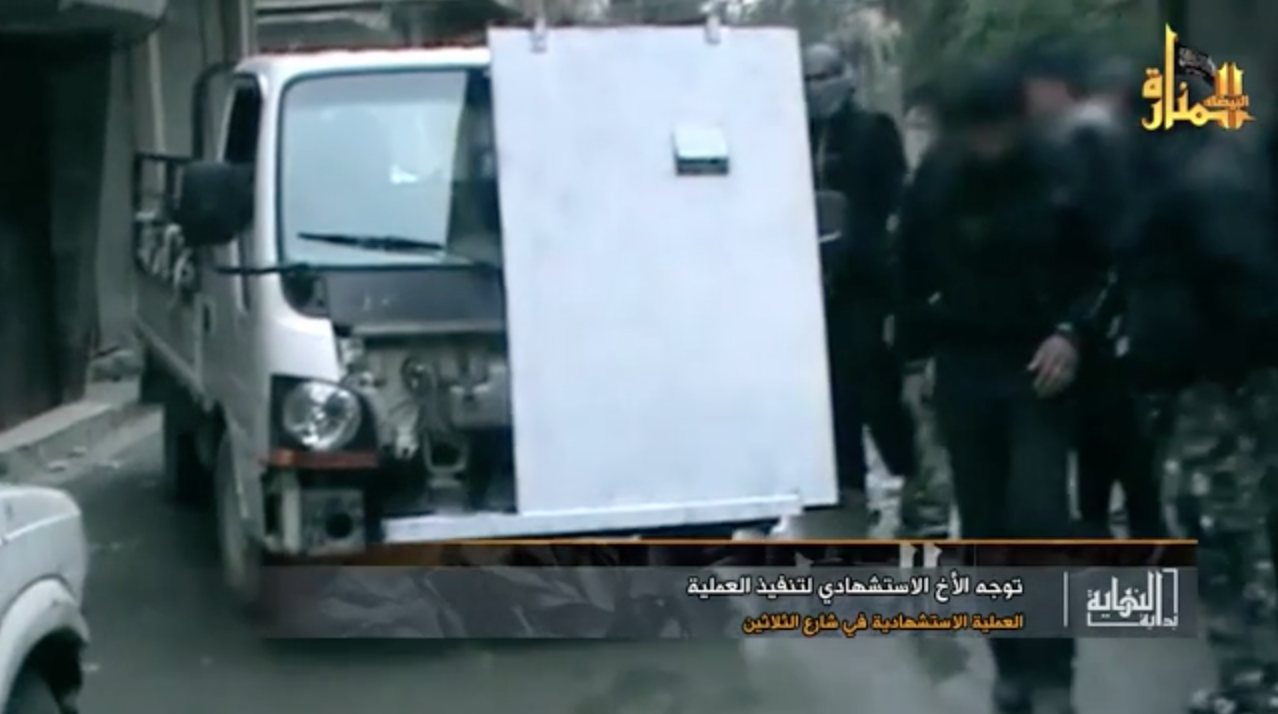
The group also began jerry-rigging SVBIEDs out of captured armored vehicles, mostly variants of the Soviet-made BMP-1 armored personnel carrier. With its tracks and large rear troop compartment it was a natural choice, especially for targets requiring off-road capabilities. The comparatively reserved use of SVBIEDs by JaN (in contrast to that of ISIS)11 meant that the group employed fewer but larger SVBIEDs against carefully chosen targets, eventually making SVBIEDs based on BMP-1 variants the most commonly used type. With the rear doors and hatch typically welded shut, the encased BMP-1 hull would also amplify the blast wave upon detonation, rendering it a superior shell vehicle in all aspects but speed.
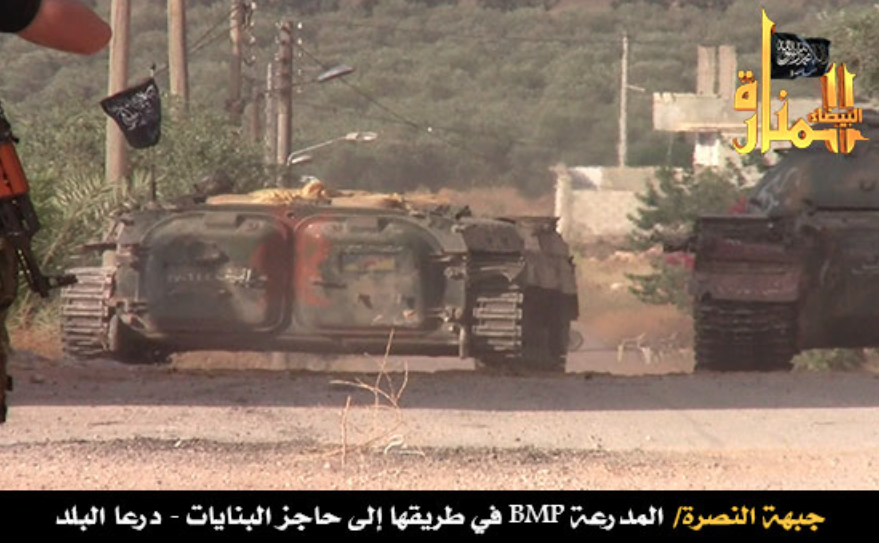
As fighting progressed across the country, it became increasingly conventional in nature. Between 2013 and 2015, JaN completely switched from using covert to up-armored SVBIEDs, as they began fielding them in overt confrontations with loyalist forces. Used as “shock and awe” weapons meant to soften up positions before combined infantry and armored vehicle assaults, the group had in effect transformed the SVBIED into a conventional weapon.12 This wholesale progression from using covert to up-armored SVBIEDs is rare among groups that employ SVBIEDs, although ISIS made a similar transition as they rampaged across Iraq and Syria in 2013-14.13
Beginning in 2015, JaN narrowed the geographical focus of its attacks to greater Idlib Province in northwest Syria, where a coordinated and prolonged offensive by the group and its opposition allies commenced in the spring.14 With the help of more than a dozen up-armored SVBIEDs (eight of which were based on BMP-1s), they were able to capture Idlib city and successfully expel loyalist forces from the entire province in less than two months — an unprecedented victory.15
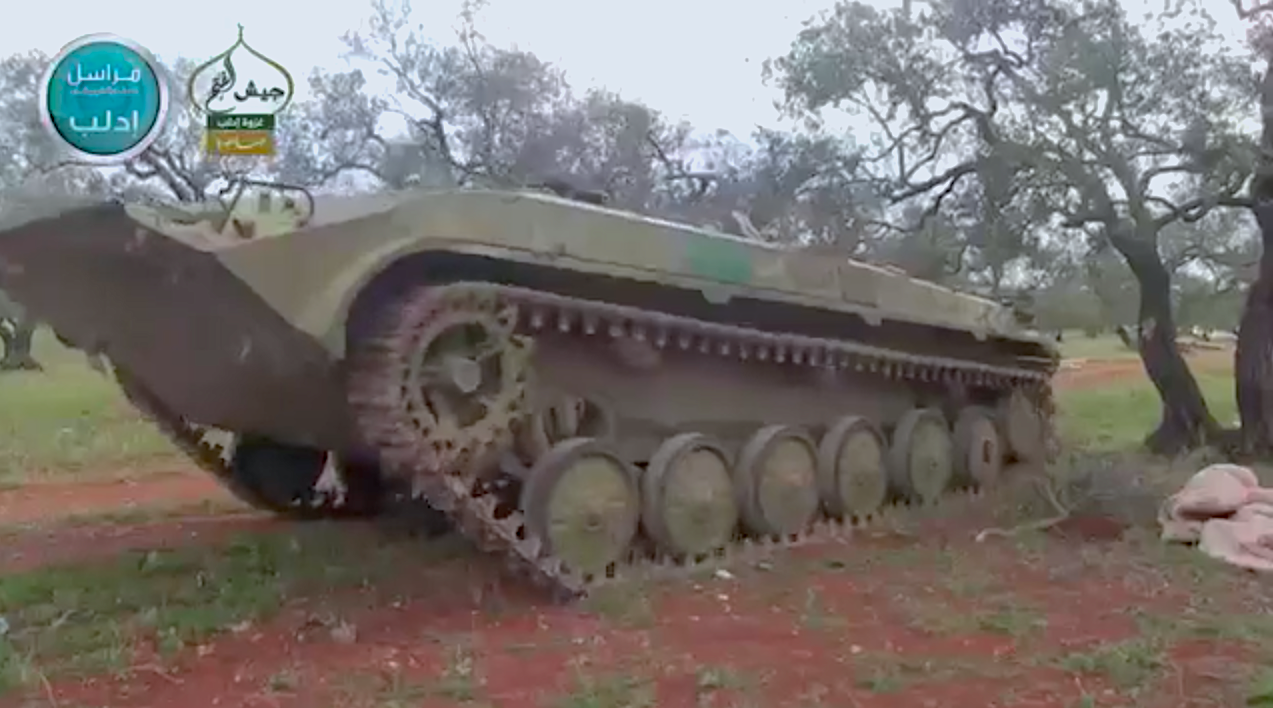
However, this success led directly to the Russian intervention in the conflict in late 2015,16 which would again tip the balance of power massively in favor of the government. This led to the third phase of JaN’s use of SVBIEDs, characterized by a decline in offensive efficacy. In 2016, JaN and the rebels would fight a number of crucial battles against loyalist forces over the strategic city of Aleppo, where the group employed more than two dozen up-armored SVBIEDs (of which at least a dozen were based on armored vehicles).17 While initially successful in the city’s southern countryside and (temporarily) lifting the siege that had been imposed on the opposition’s urban enclave,18 the rebels would eventually be expelled from Aleppo. Losing their hold in the city was a massive blow to the opposition, and it would only get worse from there on out.
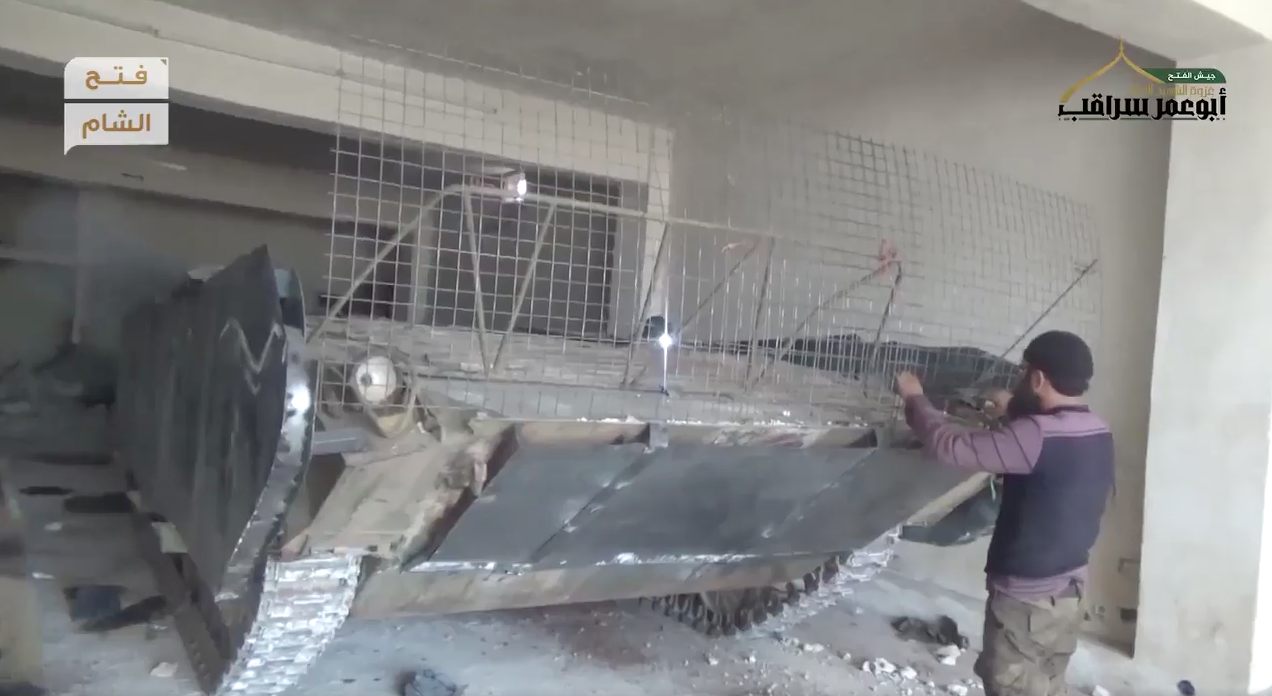
The following year would be marred by periods of costly inter-rebel fighting in Idlib Province,19 punctuated by a failed offensive against loyalist forces in northern Hama Province.20 However, it also became apparent that JaN — now operating under the name of HTS21 — was again modifying its use of SVBIEDs.
Smaller in size and with fewer resources compared to ISIS, HTS and its predecessor groups have always been more conservative in their use of SVBIEDs. As was mentioned previously, this comparatively restrained approach routinely pushed the group to opt for using fewer but larger armored vehicles (e.g. the BMP-1) as SVBIED shells in the more “conventional” battles taking place since 2013.22 While HTS would also use up-armored SVBIEDs based on various civilian vehicles, armored vehicle SVBIEDs were by far the most common choice when attacking well-defended hostile positions.

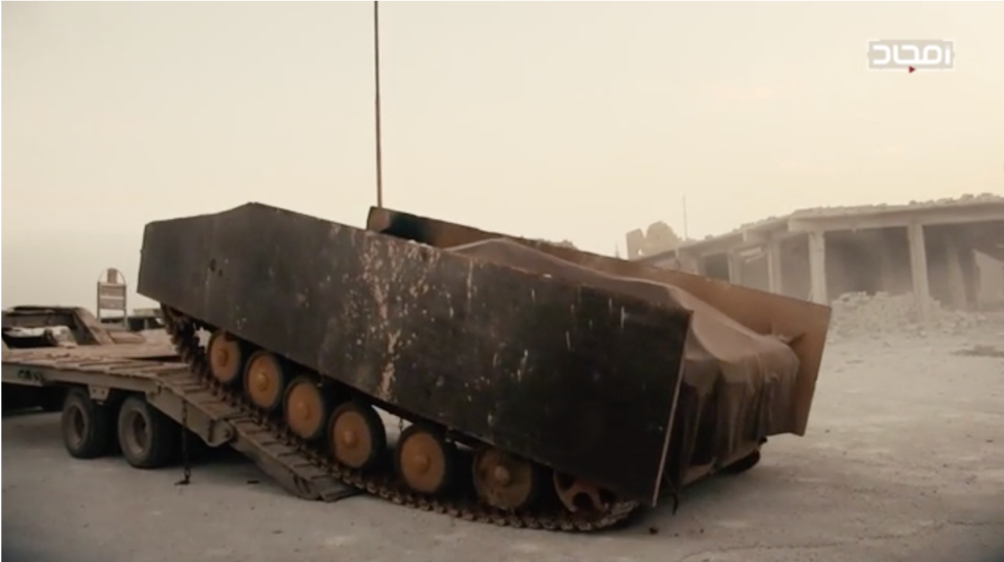
However, HTS lost scores of these armored vehicles throughout the years — in combat and as a result of using them as SVBIEDs — eventually depleting its stocks considerably. With mounting territorial losses, the group began shifting toward using up-armored SVBIEDs based on pick-up trucks in early 2017.23
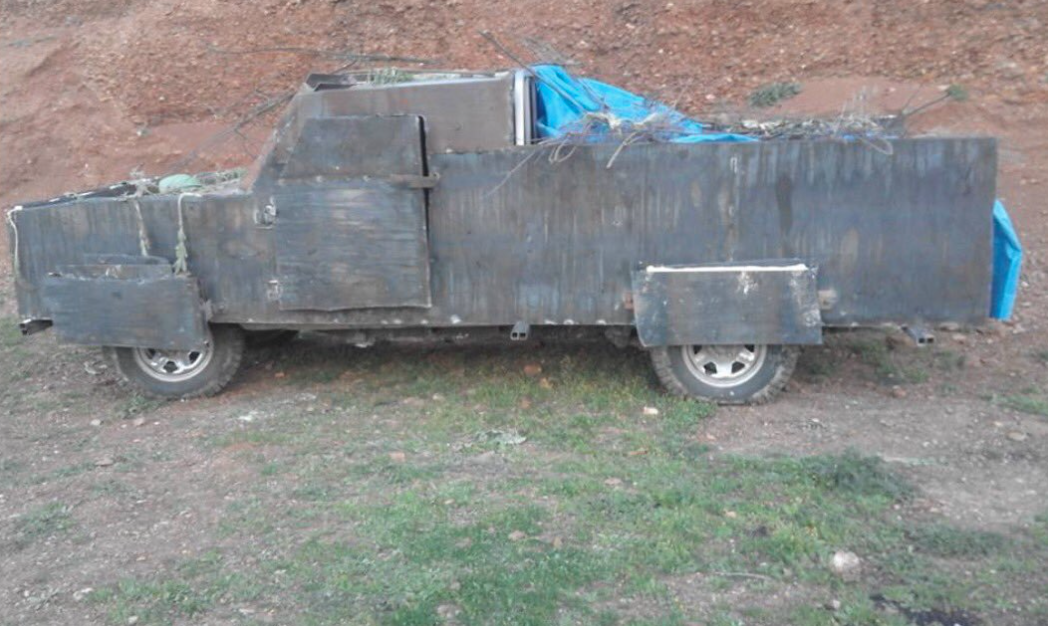
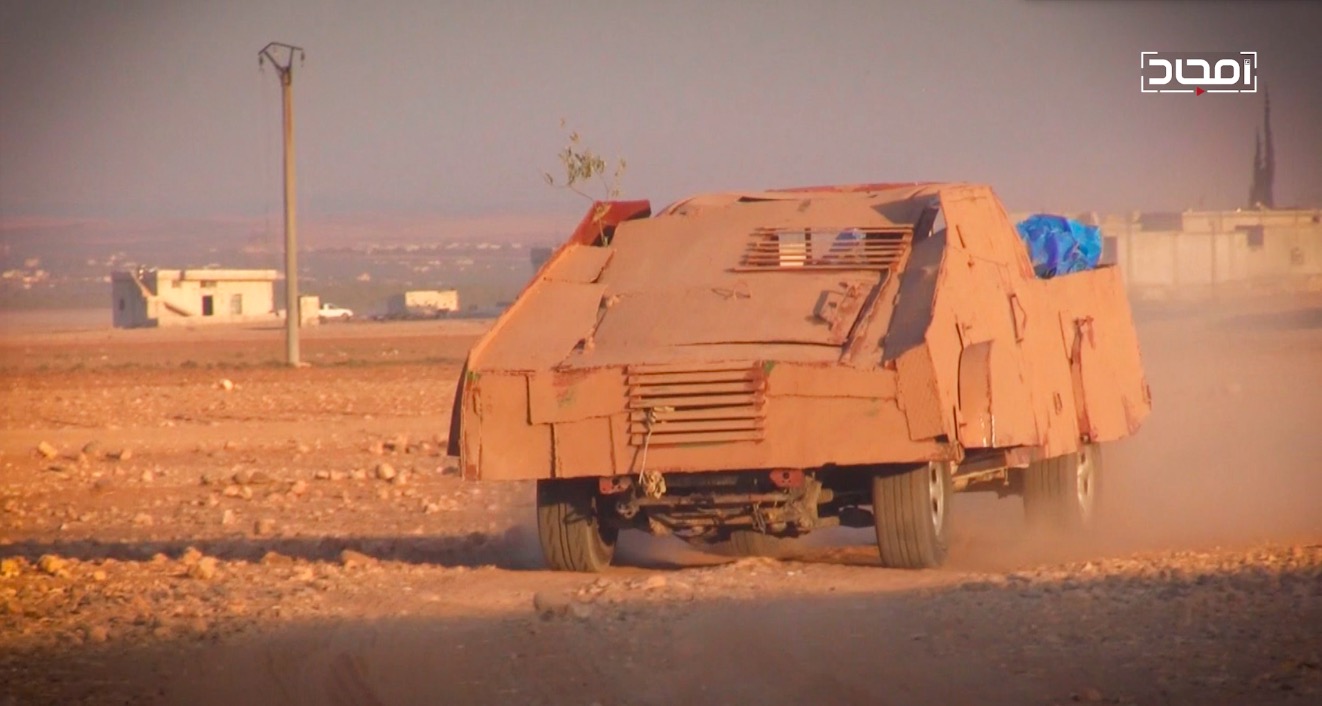
Later in the year, a multi-pronged offensive by loyalist forces and ISIS24 in eastern Hama Province that continued into 2018 led to further territorial losses for HTS and the wider opposition, reinforcing the group’s lack of momentum and rendering its use of SVBIEDs ineffective. The general loss of initiative also had an effect on the nature of HTS’s deployment of its SVBIEDs, moving it in a more defensive direction. By late 2017, the group almost exclusively reserved their SVBIEDs for critical situations where they were deployed to disrupt and slow down rapid and mounting territorial gains made by loyalist forces.25
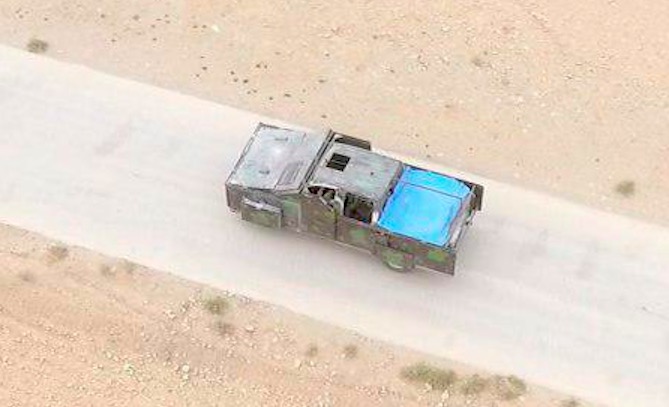

Apart from Idlib Province, opposition territory had been spread out in small pockets of control across the country for years. Beginning in early 2017, loyalist forces began amassing their troops around these small pockets, either capturing them militarily or forcing surrender agreements.26 By July 2018, the wider opposition had lost control of most of the isolated enclaves, including Wadi Barada,27 Zabadani, Madaya,28 Qaboun, Barzeh, Tishreen,29 eastern Qalamoun,30 northern Homs,31 southern Damascus,32 eastern Ghouta,33 as well as the entire southern Daraa Province.34
Following the recapture of Abu Duhur airbase in February 2018 by loyalist forces, they managed to completely expel the opposition from eastern Hama Province as well — further encroaching upon HTS’s core territory in Idlib Province. After HTS carried out an up-armored SVBIED attack against a Syrian loyalist position near Abu Duhur airbase on Feb. 7, 2018, an extended hiatus would ensue. While loyalist forces consolidated their gains and continued seizing territory elsewhere, HTS would not use any SVBIEDs in greater Idlib for more than a year.
At the same time, major powers on both sides continued negotiations. In May 2018, the Turkish Army finished constructing a dozen observation posts along the opposition’s frontline with loyalist forces and their allies, intended to prevent the breakdown of an already shaky truce.35 When Idlib Province came under increasing aerial attacks by Syrian and Russian jets in the fall of 2018 — a sign of an upcoming offensive — Turkey and Russia signed a demilitarization deal aimed at creating a 25-kilometer-deep buffer zone along the frontlines in opposition-held territory.36 However, the success of the deal hinged on a far-fetched clause stipulating HTS withdraw their forces and heavy equipment from the buffer zone.37
"Throughout the conflict, HTS has remained the most prolific user of SVBIEDs among all the disparate opposition factions. However, its use of this powerful weapon has changed dramatically over time and evolved in a continuous attempt to adapt to changing circumstances on the ground."
The 2019 Offensive
After having gathered on the Idlib frontlines in late April 2019, loyalist forces launched an offensive, citing HTS’s repeated failures to withdraw their forces from the designated demilitarized zone, despite extensions of the deadline.38 After a week of intense aerial bombardment by Syrian and Russian jets, loyalist forces began advancing.39 On May 8, 2019, they seized control of the strategic town of Kafr Nabudah in the northern Hama countryside.40 In a failed bid to retake the town on the same day, HTS used their first SVBIED of the offensive. Approaching southwards from Tell Hawash, the vehicle came under fire before driving off the road and detonating at a crossing directly west of Kafr Nabudah.41 42

In the next two weeks, loyalist forces would continue their advance, absorbing more villages and foiling repeated attempts by HTS and other rebels to retake Kafr Nabudah. After a short truce, HTS launched a counterattack on May 21, employing another SVBIED northeast of Kafr Nabudah, before recapturing the town the next day.43
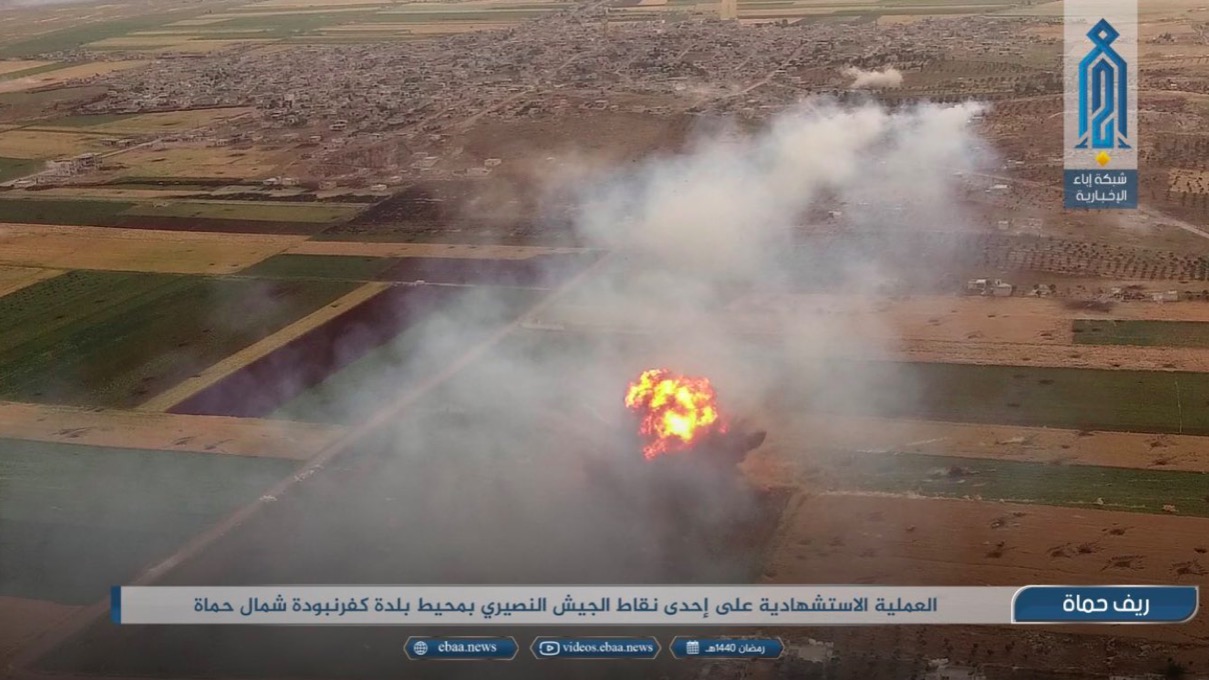
HTS would hold on to Kafr Nabudah until May 26, when loyalist forces reclaimed it after a wave of incessant bombardment.44 During the battles of Kafr Nabudah, one of the SVBIEDs used by HTS failed, and the attack was never claimed by the group. The SVBIED, an up-armored BMP-1, got stuck southeast of Kafr Nabudah near Sakhr sometime between May 12 and 26,45 and was later detonated by loyalist sappers.

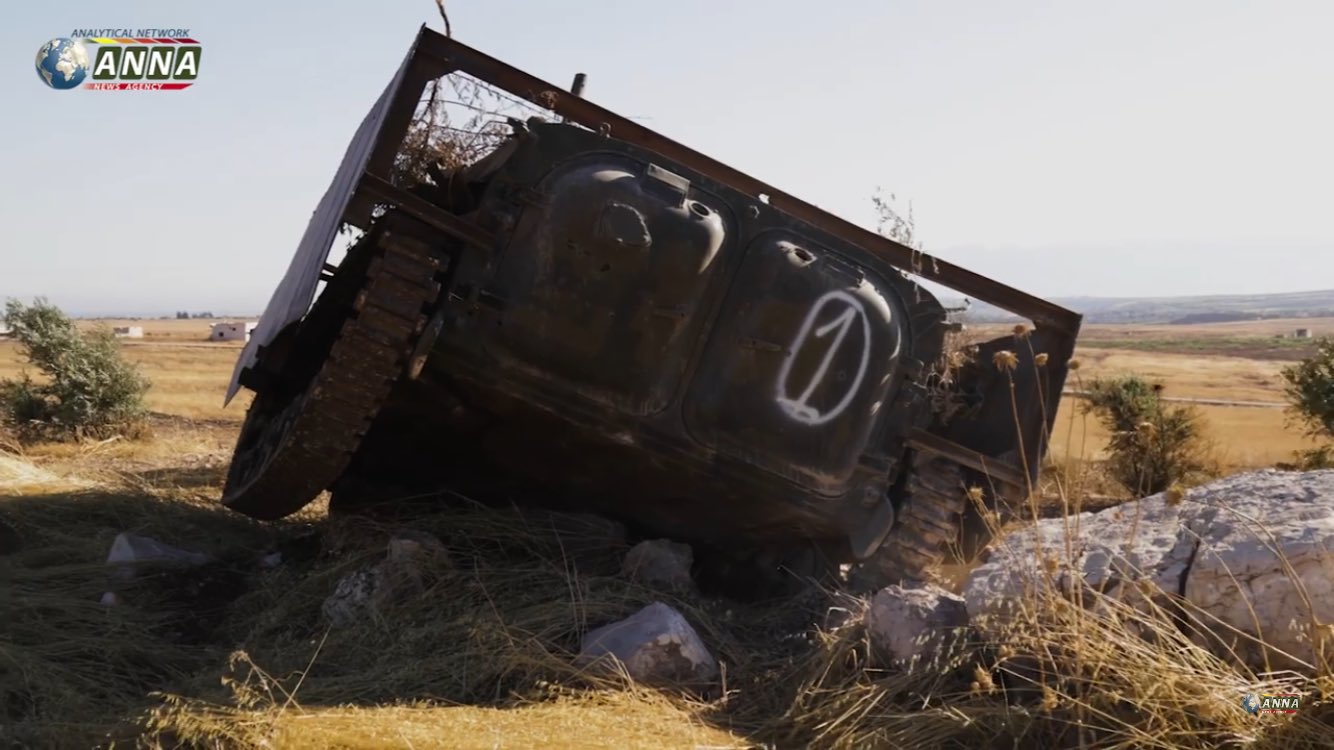
On June 6, 2019, HTS launched another counterattack, intending to reclaim previously lost territory. The attack began further south of Kafr Nabudah along the frontlines, and the rebels were able to seize Tel Malah, cutting off a loyalist supply route between Muhrada and Suqaylabiyah. The following day, an HTS up-armored SVBIED achieved a direct hit on a group of loyalist fighters at a compound northwest of Tel Malah.
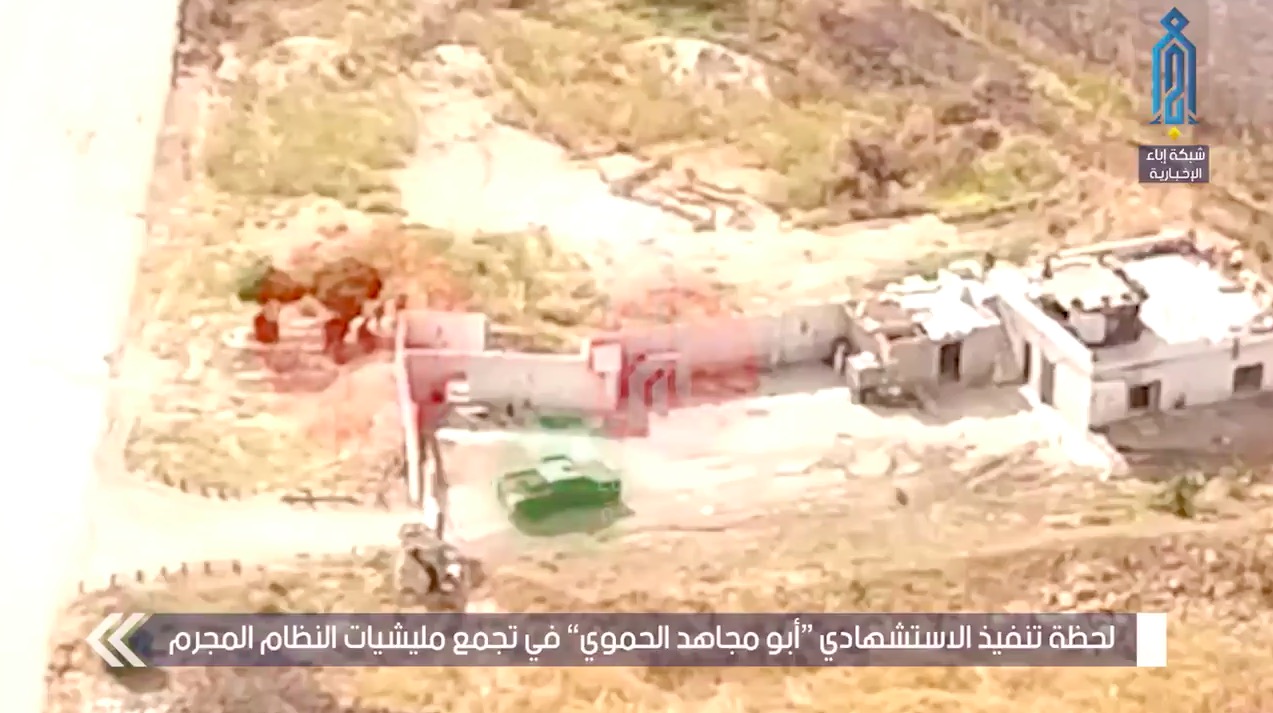
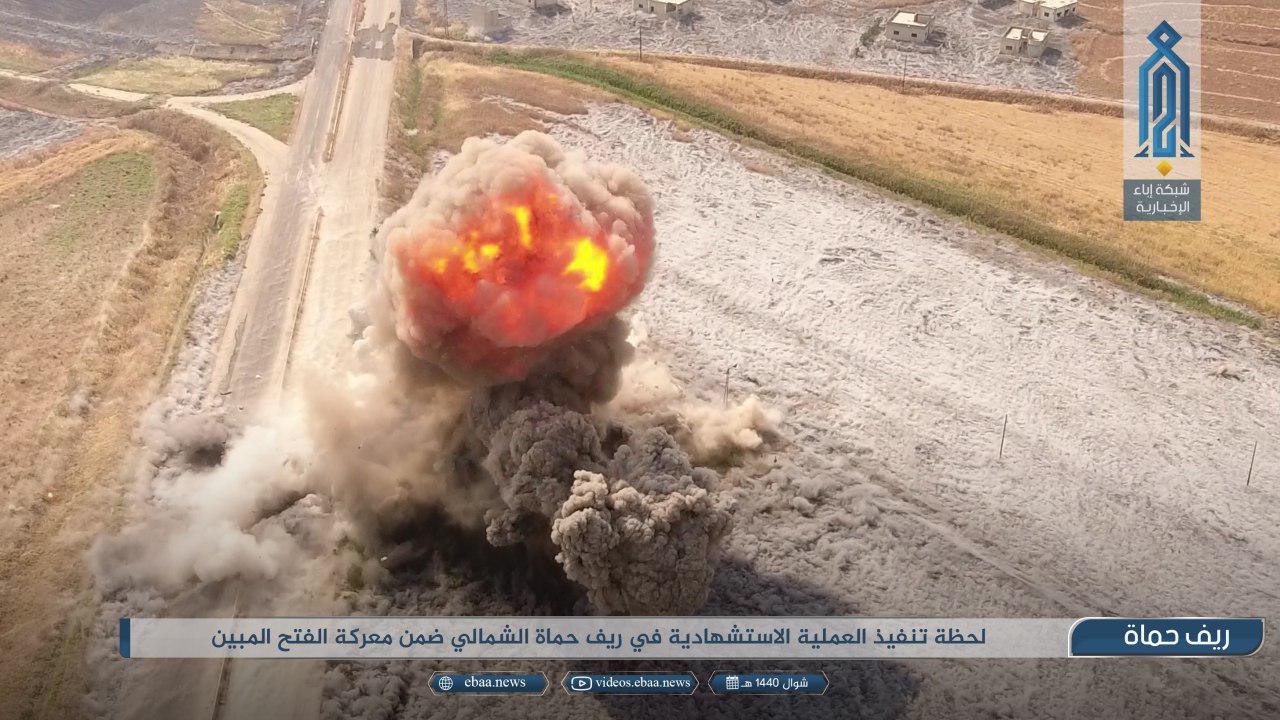
On June 8, another HTS up-armored SVBIED reached even further, striking a loyalist position at the opposite entrance of Jalmeh, a village northwest of Tel Malah. Unofficial footage showed the SVBIED, based on a pick-up truck, racing toward its target.

Hama on June 8, 2019.
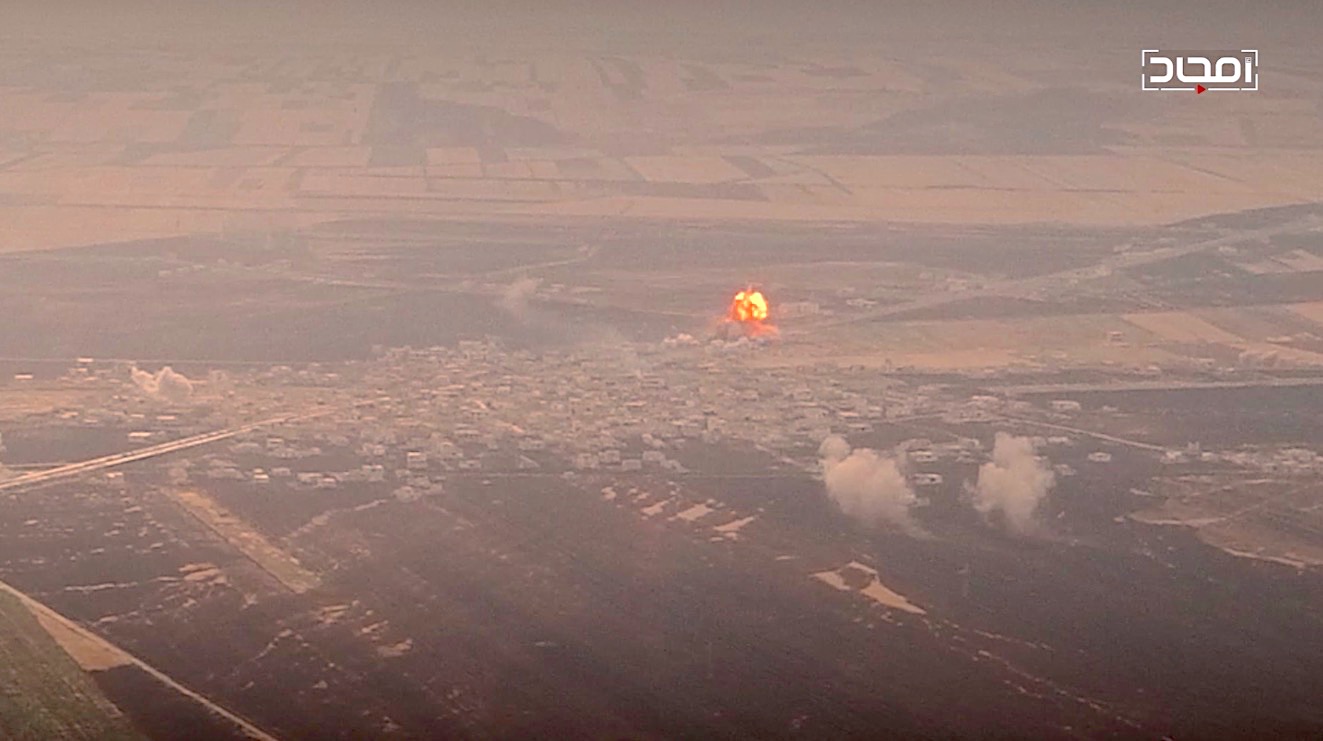
Up until this point, the SVBIEDs used by HTS were familiar designs that had been used extensively in the years prior to the 2019 offensive. The distribution of shell vehicles was also similar to recent years, with the majority based on pick-up trucks and a minority of larger examples based on BMP-1s.
Following the June 8 SVBIED attack by HTS, there would be a pause in suicide attacks for almost two months. During June and July, fighting mostly drew to a stalemate, with sporadic raids and counterattacks by both sides. However, loyalist aerial bombardment ramped up again in late July,46 with the rebels losing control of Tel Malah on July 29.47 On Aug. 1, the rebels were pushed back further when loyalist forces captured Hasraya. On the same day, HTS used an up-armored SVBIED against a loyalist position there. Unofficial footage showed that the SVBIED was another example of the standardized up-armored pick-up truck.

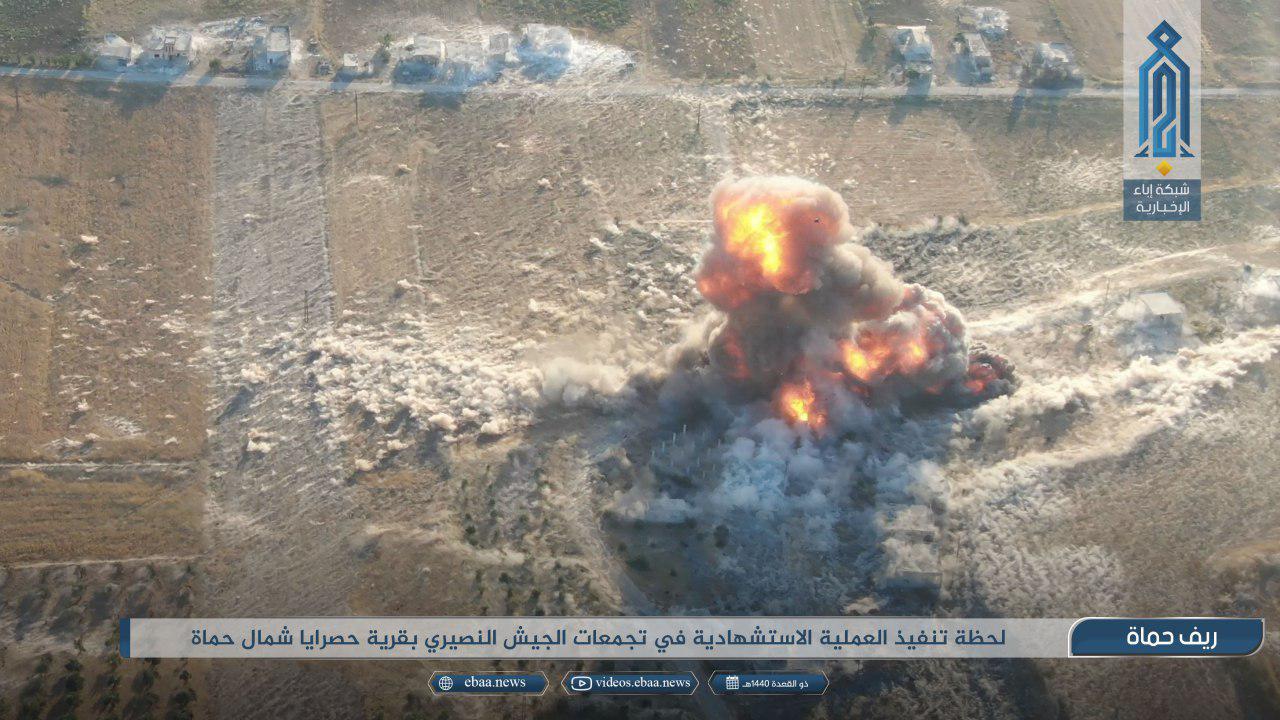
With their sights set on Khan Shaykhoun — the largest town in the southern part of the greater Idlib pocket — loyalist forces opened a second front in an attempt to besiege opposition-held villages south of the town. Advancing toward Khan Shaykhoun from the southeast, they were able to capture Tel Sukayk on Aug. 10, despite HTS conducting a successful SVBIED attack on a group of vehicles there.

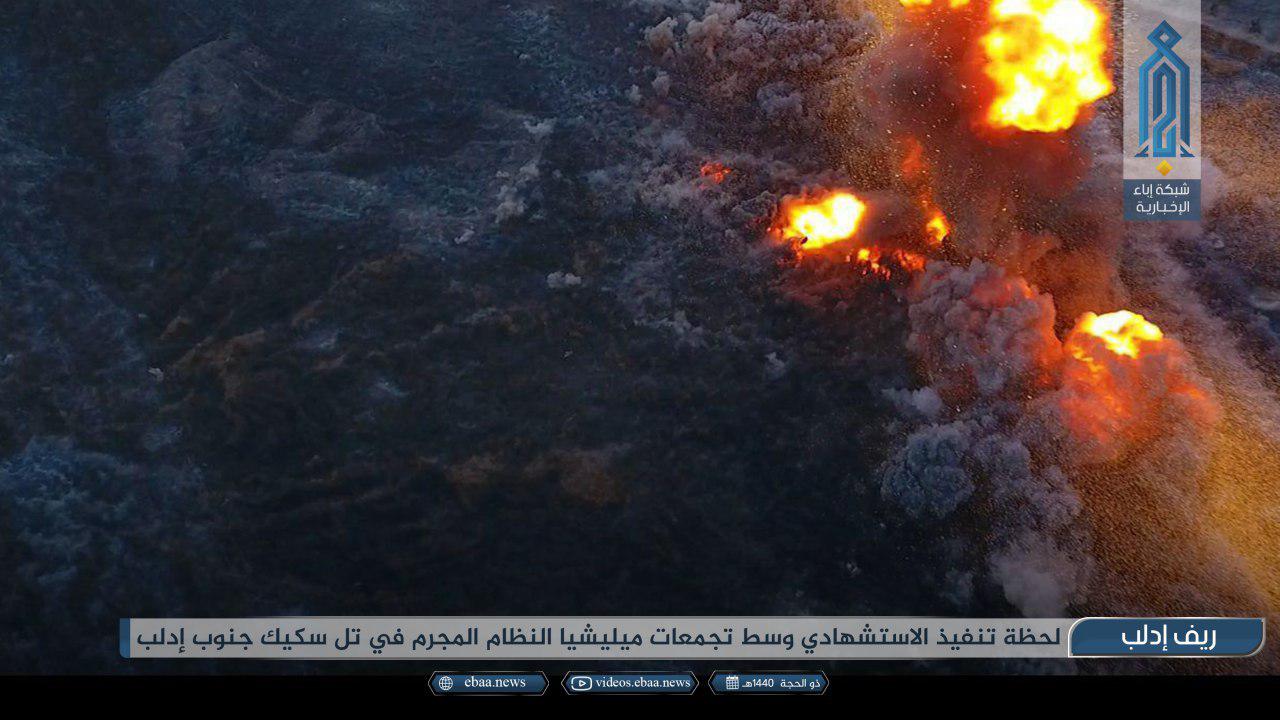
HTS would go on to use another two SVBIEDs in their unsuccessful defense of Sukayk village in the following days, one on Aug. 13 and a second one two days later, signifying an increase in the tempo of SVBIED attacks.
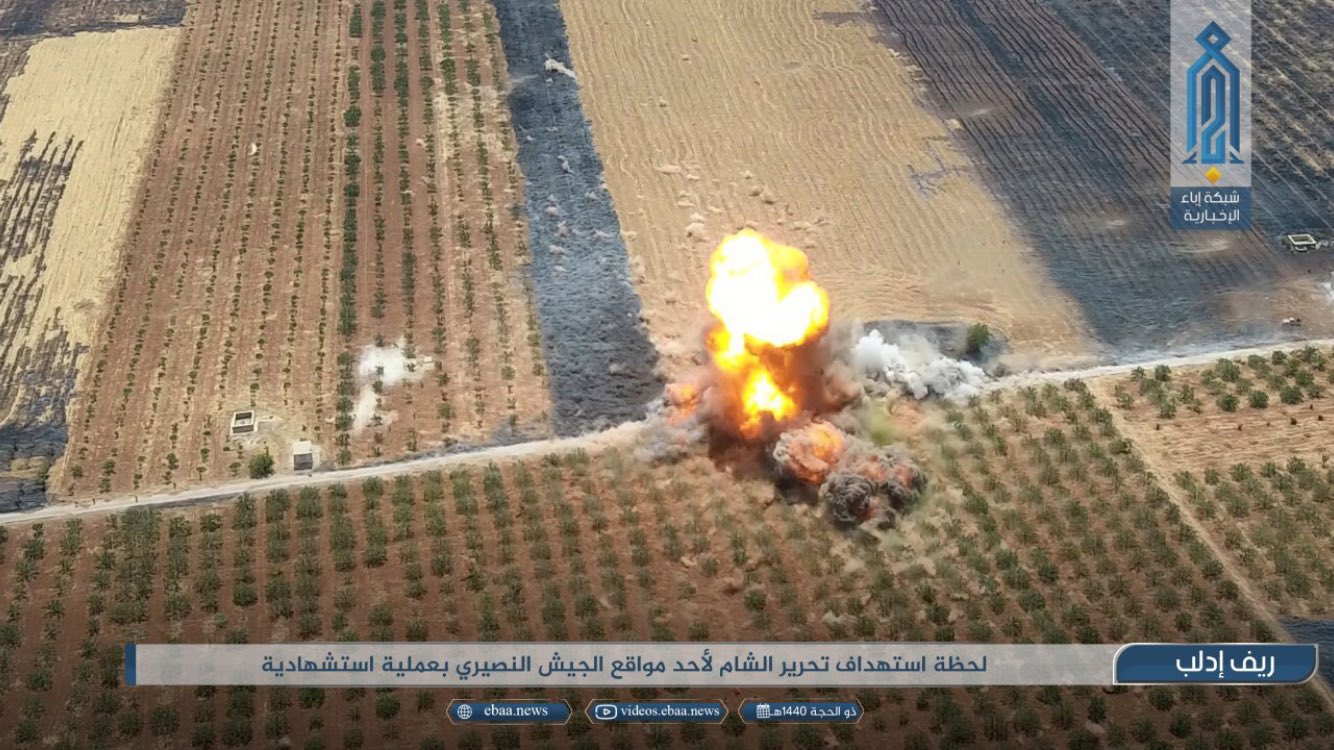
However, as HTS was launching SVBIEDs on the town’s eastern flank, loyalist forces easily rolled through rebel defenses west of Khan Shaykhoun, capturing five villages.48 Shifting their attention to the west, HTS used an up-armored SVBIED against a loyalist position northwest of Khan Shaykhoun in Madaya in the late afternoon of Aug. 16.
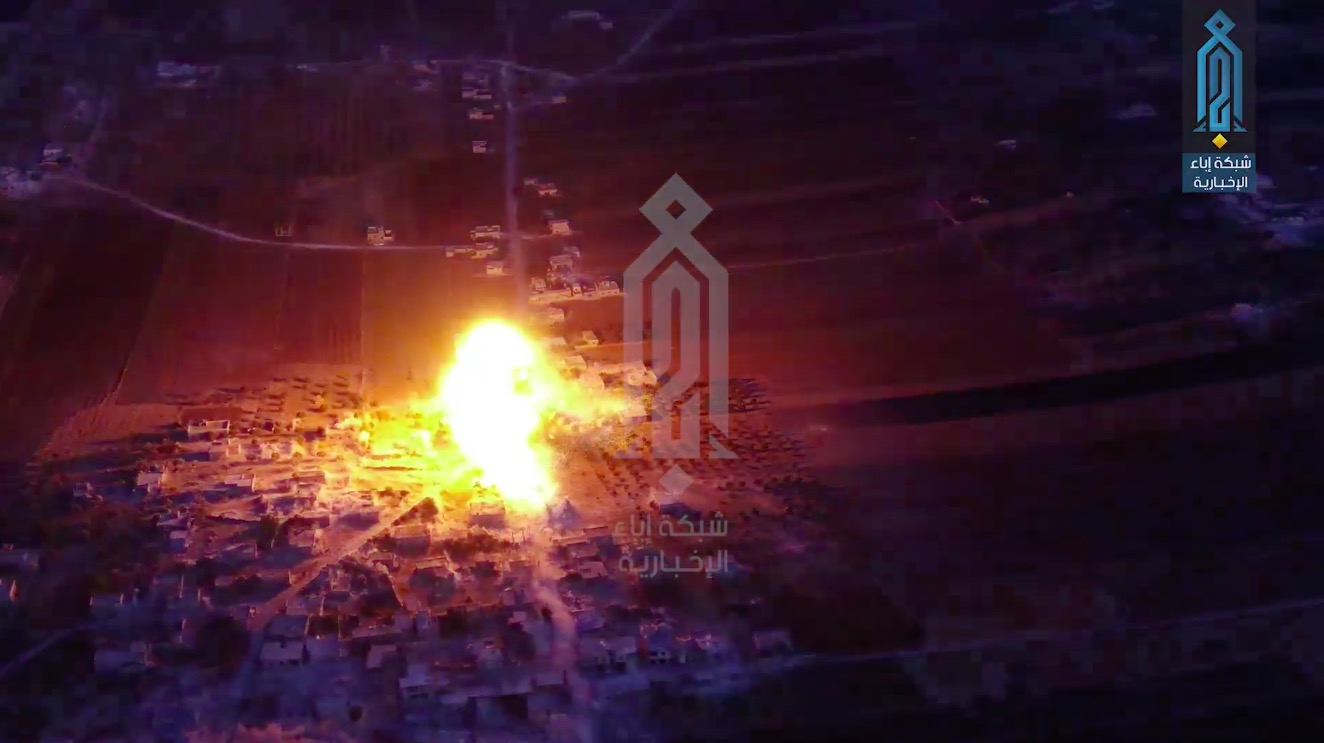
Two days later, HTS employed another SVBIED, this time also allegedly against a loyalist position in Madaya. While footage of the blast itself was never made public, footage released by HTS did show the vehicle. It had been stored in a forward hide site on the eastern outskirts of Hesh adjacent to the M5 highway, north of Khan Shaykhoun, and was seen backing out and speeding off toward Madaya, more than 12 kilometers away.49 Interestingly, the vehicle was the first documented example of a new and improved design of up-armored SVBIEDs used by HTS.
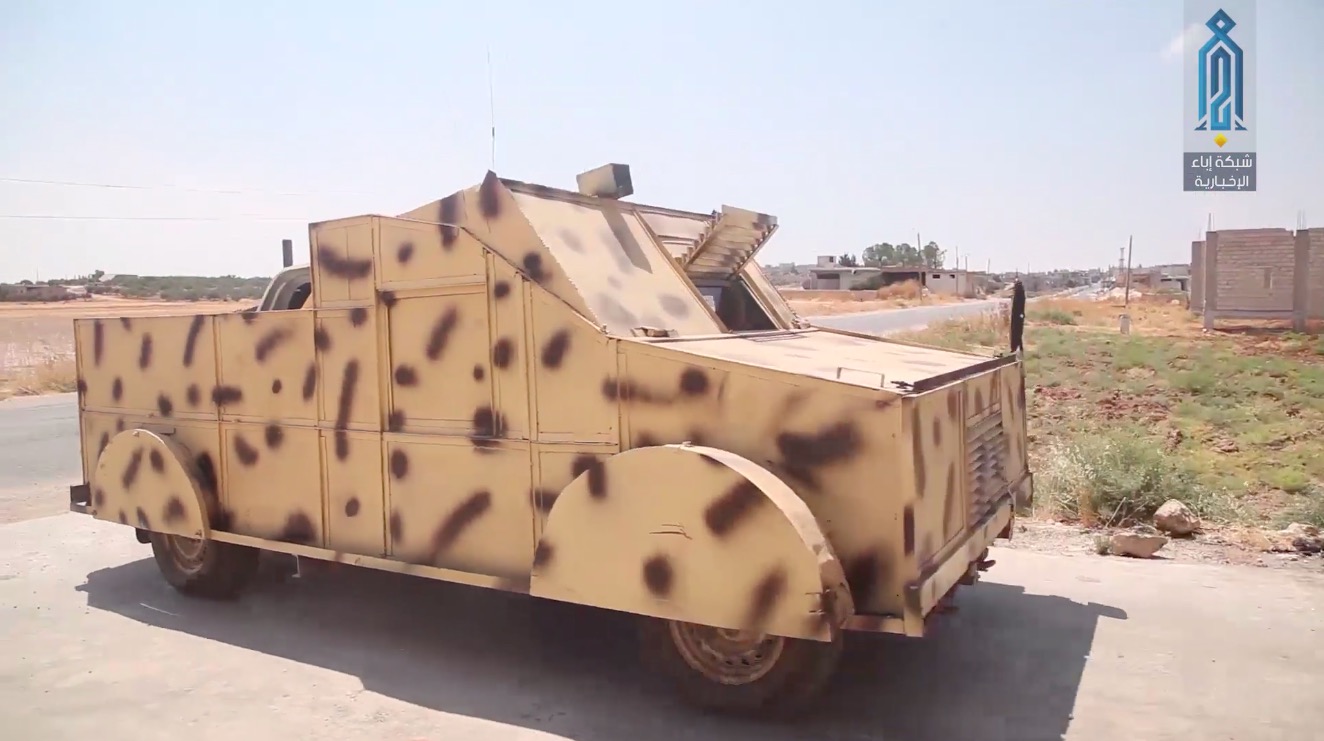
The armor kit mounted on the vehicle had been painted in a tan color and then covered in black dots, forming a rudimentary camouflage pattern that matched the operational surroundings in which it was used. This was the first time HTS had manufactured and used an environment-specific SVBIED design. This design type was employed extensively by ISIS in the Syrian and Iraqi deserts since early 2016 in order to blend in with the open terrain and plains where advancing SVBIEDs had little cover.50 Facing growing pressure in a gradually shrinking area, HTS likely sought to increase the success rate of their SVBIED attacks in a similar fashion. Later it would become evident that the SVBIEDs used by HTS earlier during the offensive also had received brown paint jobs that better matched the muddy operational surroundings during spring and early summer.
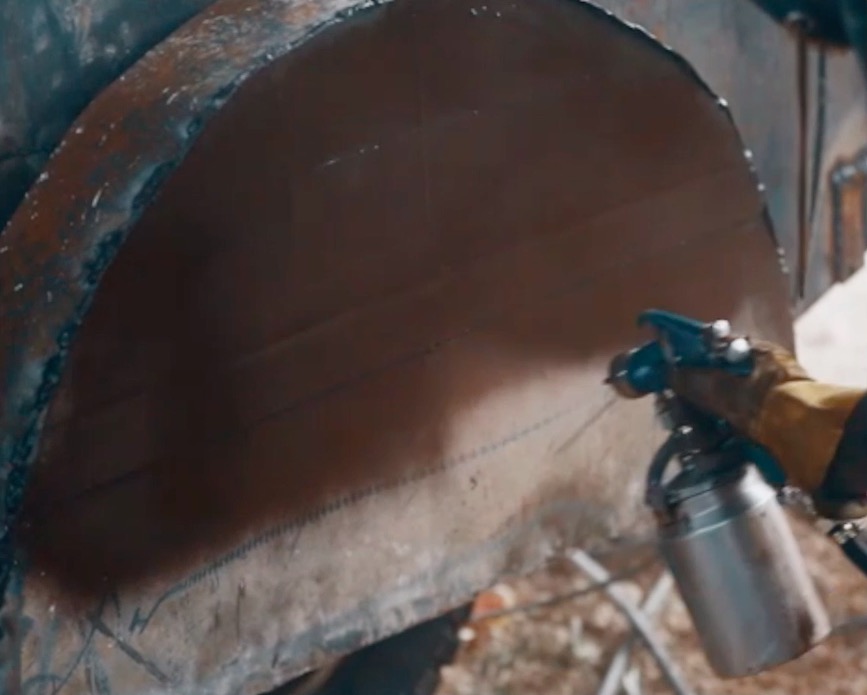
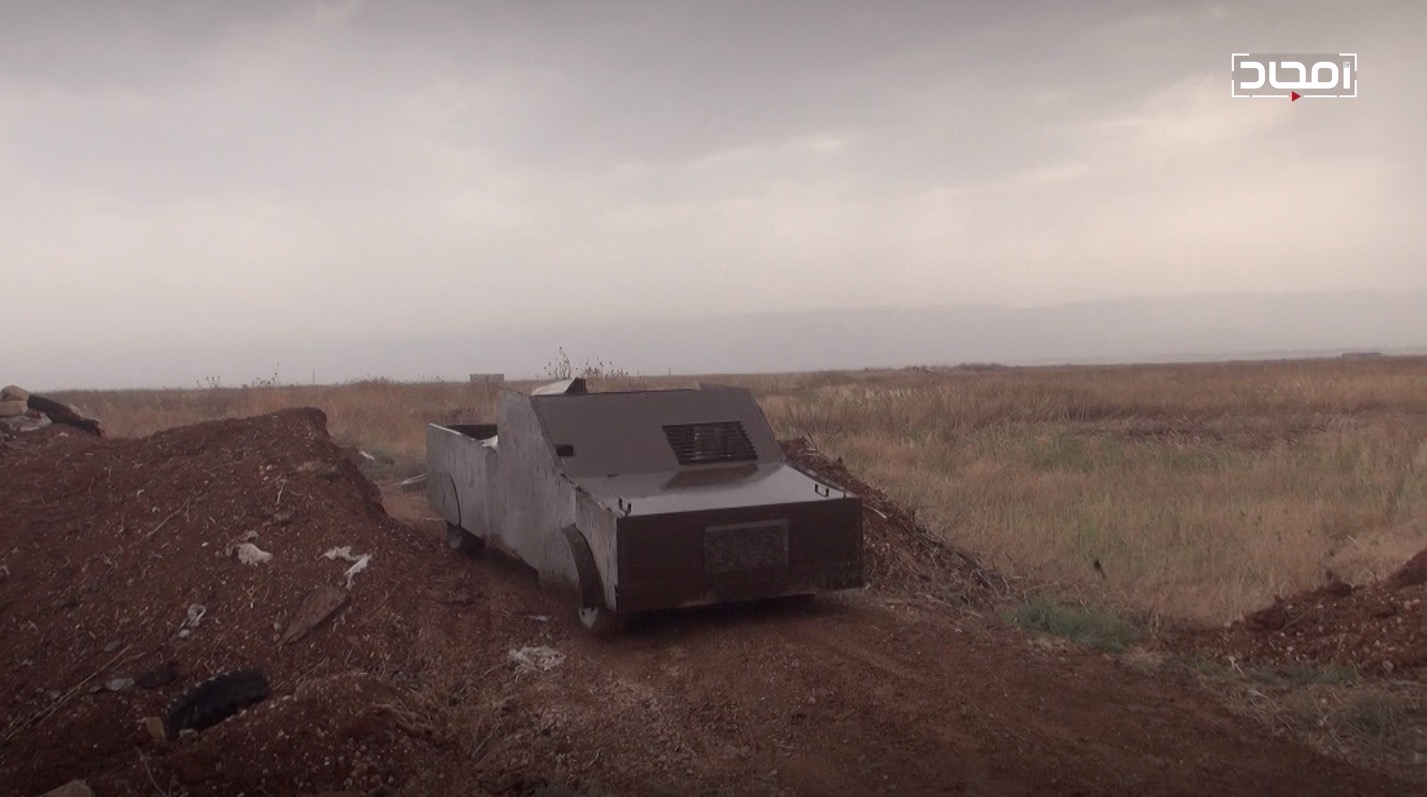
Later the same day, HTS would launch a second up-armored SVBIED at a loyalist position near Kafr Doun, the next village over from Madaya. This vehicle was also one of the new environment-specific designs.
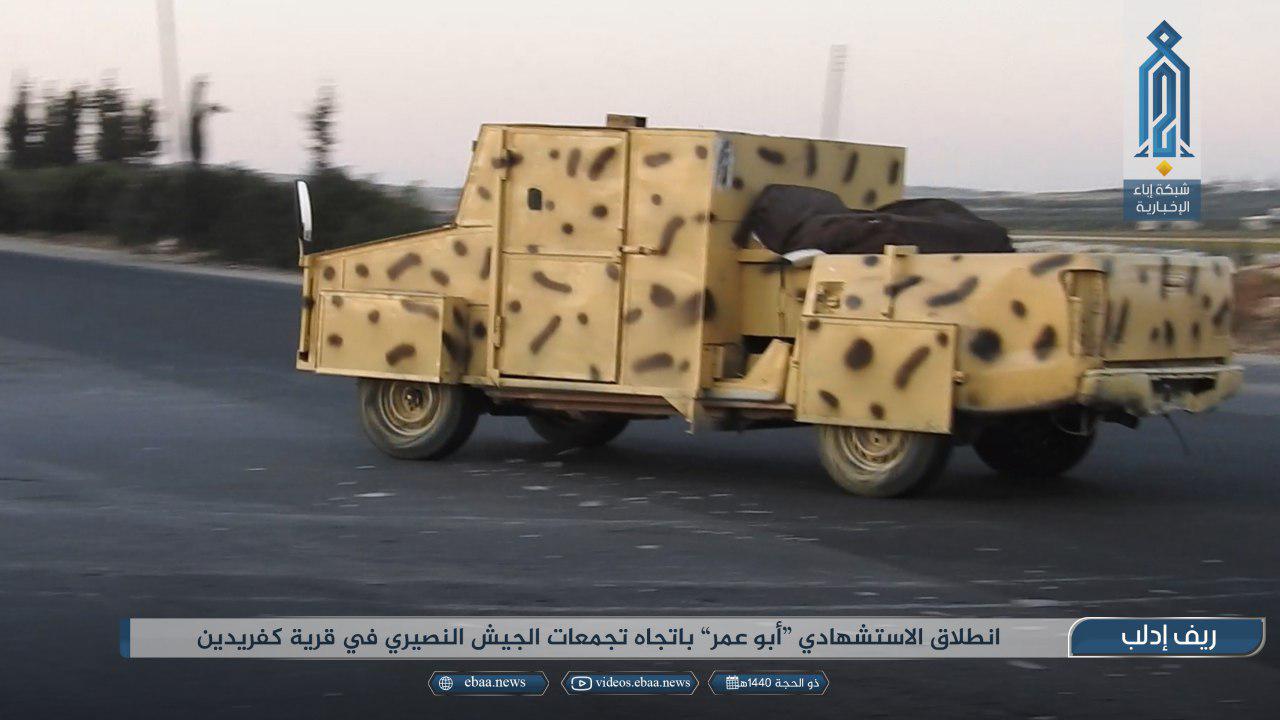
However, HTS’s attempts to slow down the loyalist advance were ultimately fruitless. In the group’s weekly newspaper released the day before, it was argued that the use of SVBIEDs was meant “to absorb the attacks of the [loyalist forces] supported by the Russian occupation.”51 Even so, loyalist forces were able to capture Khan Shaykhoun just two days later, on Aug. 20.52
Under threat of imminent siege, opposition forces quickly evacuated territory south of the town, allowing loyalist forces to capture the entire rebel pocket on Aug. 23.53 Around the same time, another example of the new SVBIED design crashed in a field south of Tell al-Tarei, directly east of Khan Shaykhoun.
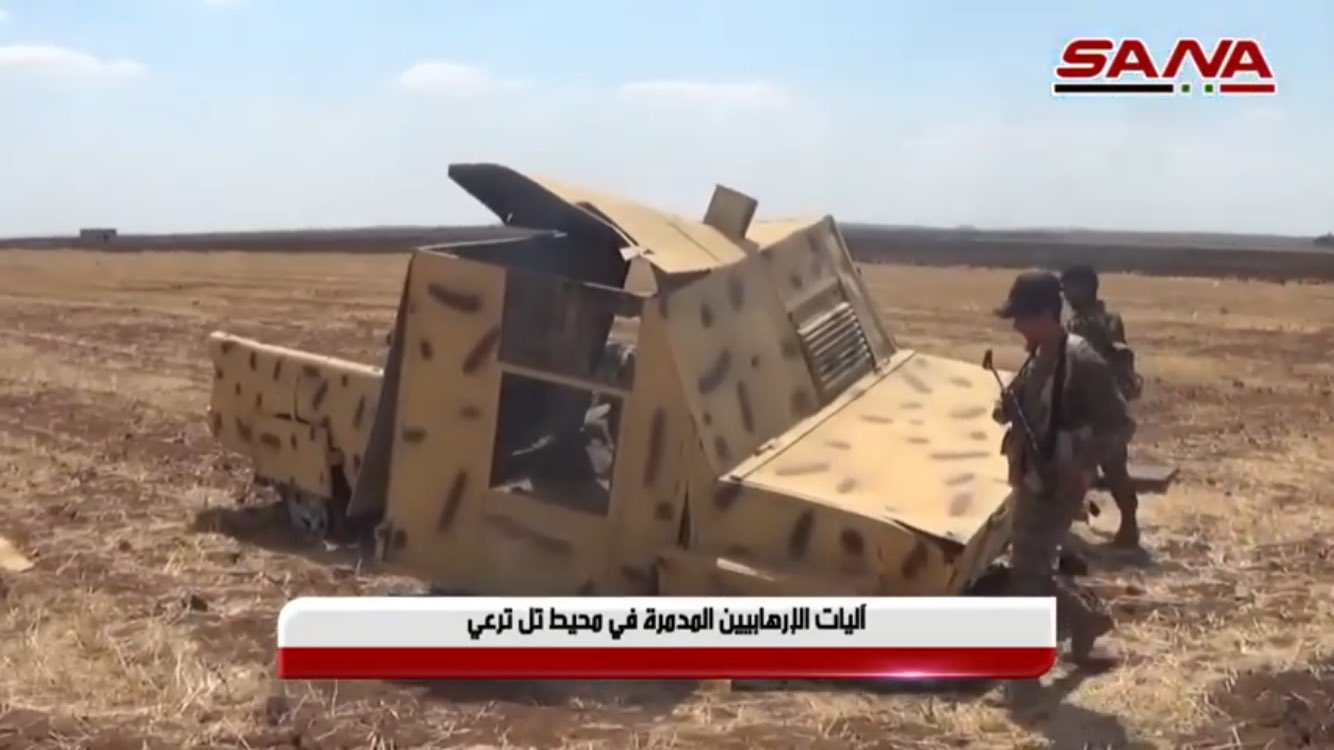
On Aug. 27, the new SVBIED design appeared again, this time as part of a diversionary counterattack in southeast Idlib, near Abu Dali. The identifying number “45” had been painted on the windshield armor, a first for this design.
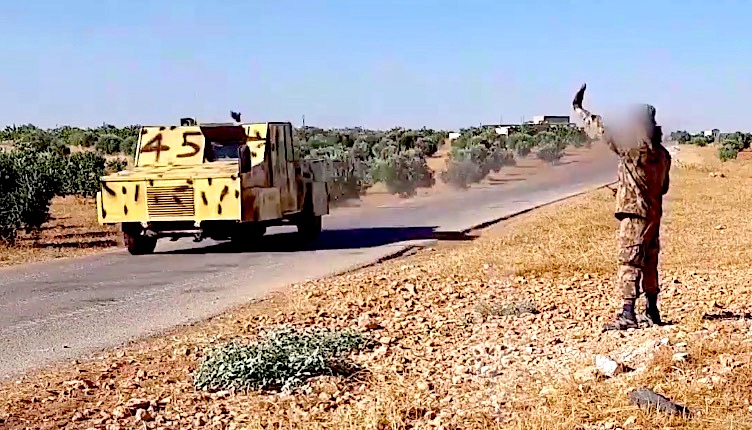
When loyalists began advancing on al-Tamanah, HTS employed another up-armored SVBIED on Aug. 29 that managed to achieve a direct hit on a group of tanks close to the village. Nevertheless, the town was lost later the same day.54

Having swept up the villages surrounding Khan Shaykhoun, loyalist forces declared a unilateral cease-fire in order to consolidate recently acquired territory and prepare for the second phase of the offensive.55 HTS would not use any SVBIEDs for almost four months, as the frontlines remained static and fighting largely subsided.
Around the time the loyalist offensive resumed in December 2019, HTS proclaimed that the use of SVBIEDs had “become an essential cornerstone in battles,” and that it was “not restricted to offensive use,” but “also has its role in repelling the enemy.”56 As loyalists pushed from the southeast toward Maarat al-Numan, HTS launched an SVBIED against a gathering of loyalist forces in al-Rafah village. Immediately after the blast, at least two dozen vehicles and more than a hundred loyalist fighters quickly withdrew, fearing further attacks. This is a testament to the psychological impact of employing SVBIEDs. In the words of one of HTS’s suicide bombers, the use of SVBIEDs inflicts “terror and horror in [the enemies’] hearts,” while at the same time “lifting the morale” of fellow fighters.57
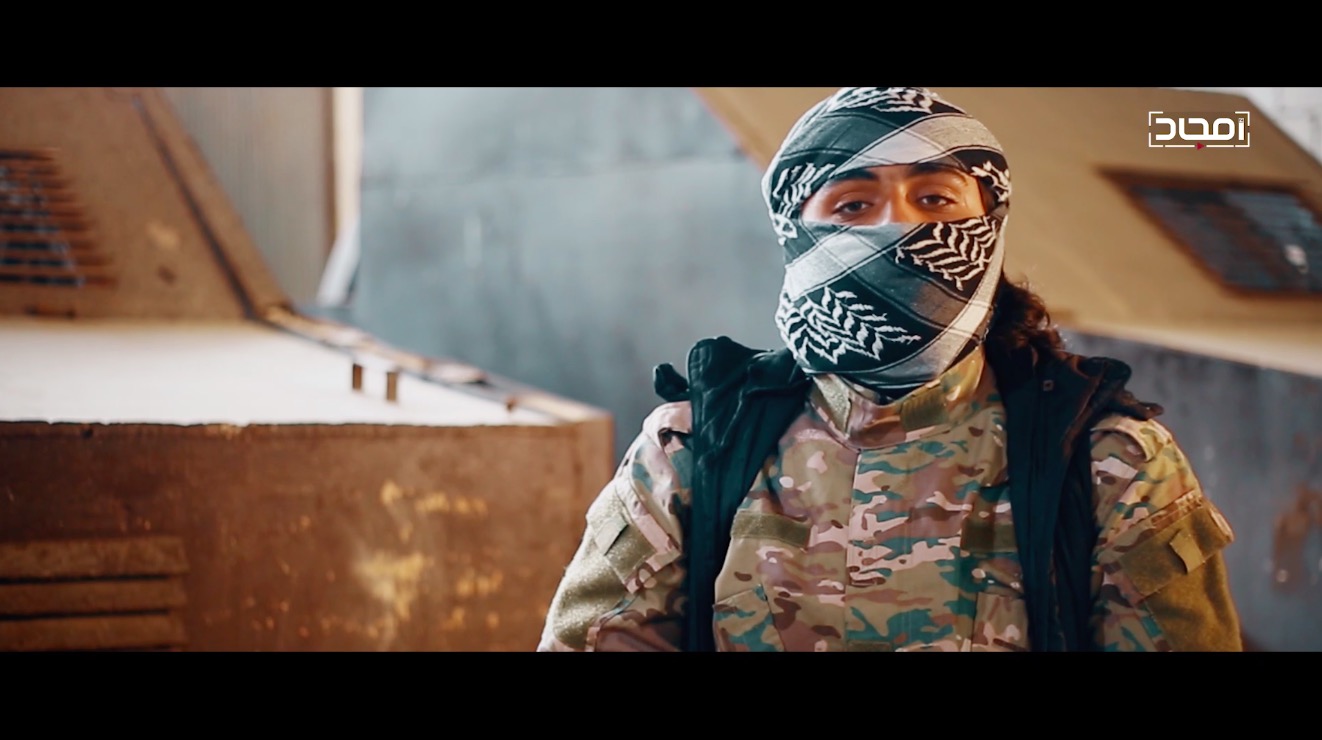
On Dec. 24, a day after loyalists had captured Jarjanez, HTS launched another SVBIED attack. Although the counterattack itself failed in recapturing the town, the SVBIED attack was very revealing. As the vehicle approached the town, it did so unhindered. The few loyalist fighters who noticed the up-armored SVBIED ran in the other direction, while other groups of fighters were too busy looting civilian homes to care. In the end, the SVBIED managed to detonate in the middle of the town without ever being fired upon.


When loyalist forces continued advancing east of the M5 highway, HTS launched a raid preceded by a double SVBIED attack on two of the loyalists’ positions near al-Tah on Jan. 2, 2020. The attack involved two identical pick-up truck SVBIEDs, with both vehicles detonating next to loyalist tanks.

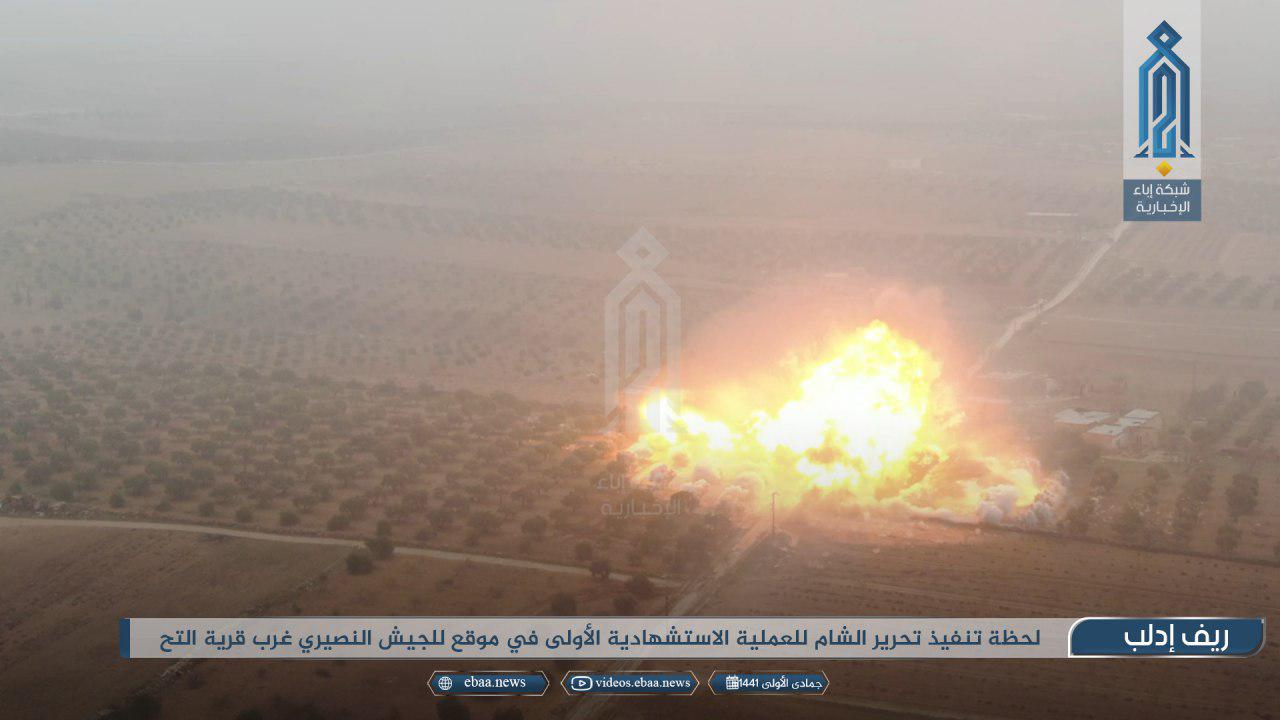
However, the attack failed to reverse the group’s territorial losses. In the final week of January, opposition territorial losses began to mount. In just four days, loyalist forces were able to capture Maarat al-Numan and extend their control over a long stretch of the M5 highway north of the town — with HTS detonating an up-armored SVBIED on a loyalist position in Khan as-Sabil north of Maarat al-Numan on Jan. 29 in order to slow down the latter’s advance.58
When the battle of Maarat al-Numan was in full swing, loyalist forces commenced another offensive, simultaneously advancing into the opposition-held southern Aleppo countryside and the western Aleppo suburbs.59 On Jan. 26, HTS used an up-armored BMP-1 SVBIED against a loyalist position at al-Zahraa district on the outskirts of western Aleppo.60
As part of a counterattack on Feb. 1, HTS deployed another three up-armored SVBIEDs against loyalist positions in the al-Zahraa district. Among the SVBIEDs used were two up-armored BMP-1 variants, as well as a heavily armored bulldozer that failed to detonate. Both of the BMP-1 variants were fitted with identical armor kits to the example used on Jan. 26, suggesting they were produced by the same workshop.
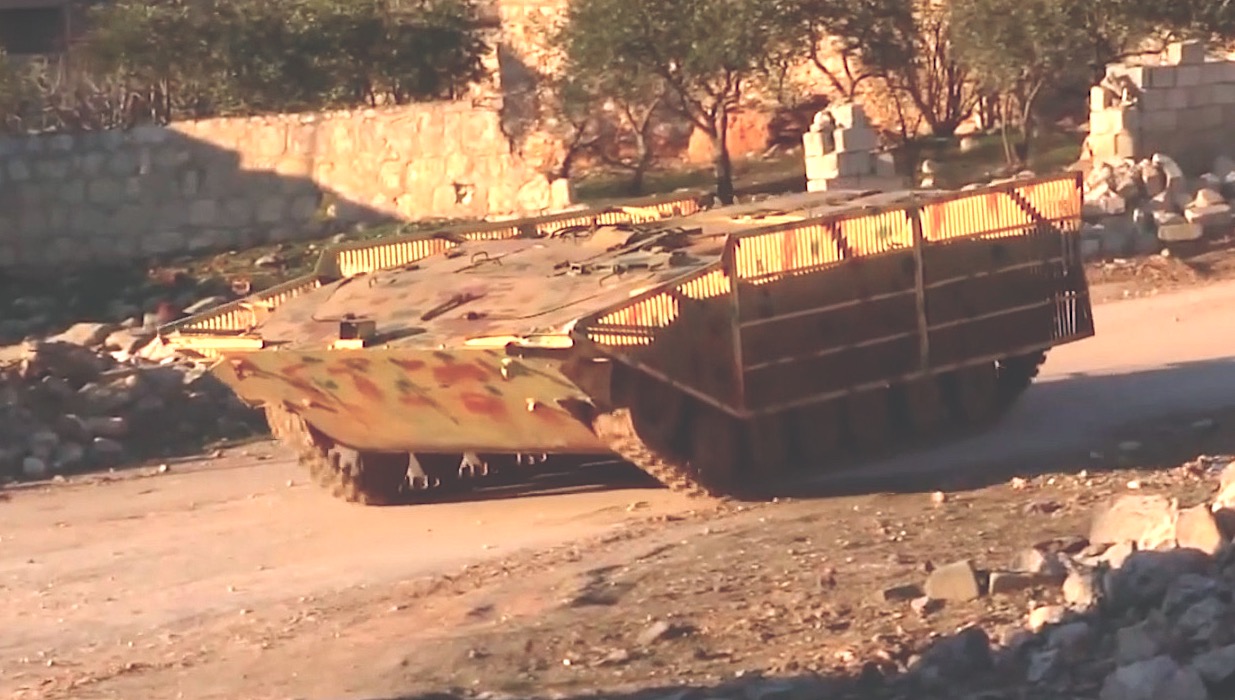
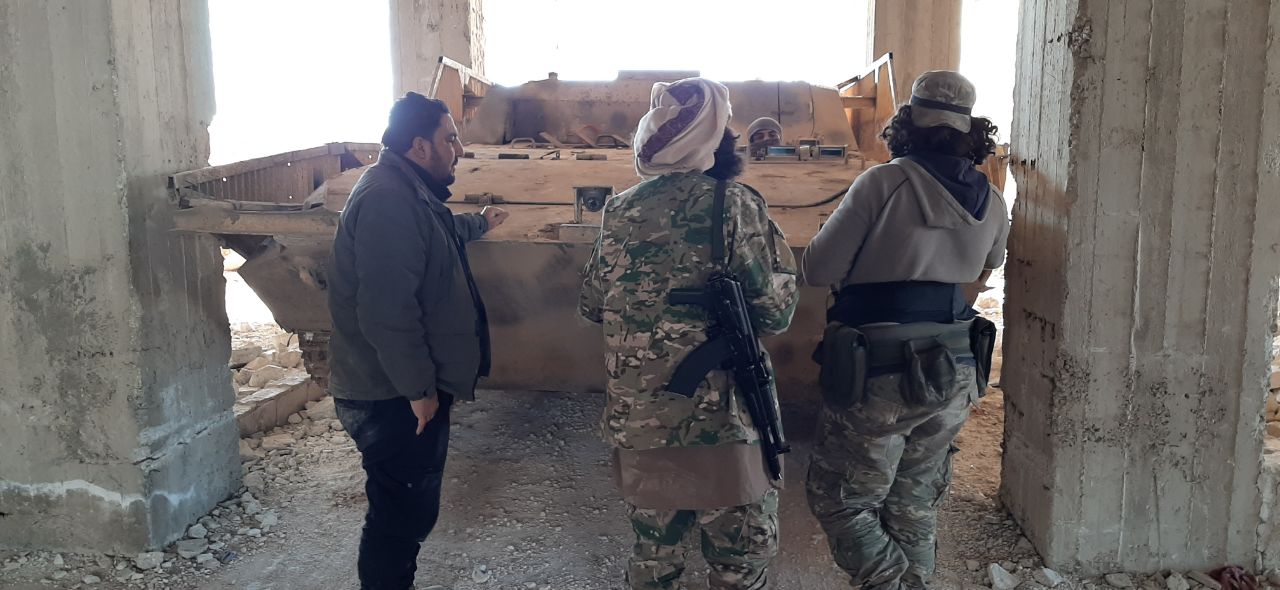
However, the sizable counterattack yielded no results for HTS and the opposition. By Feb. 4, loyalist forces were in the process of encircling the strategic town of Saraqeb, located directly adjacent to the M5 highway, less than 20 kilometers east of Idlib city. The following day, HTS used an SVBIED east of Saraqeb near Dhababiyah in a failed bid to stop the encirclement. On Feb. 6, loyalists captured Saraqeb. HTS launched a counterattack from the southwest the same day, detonating two SVBIEDs in Nayrab and Dadekh, but the little momentum gained eventually faltered.
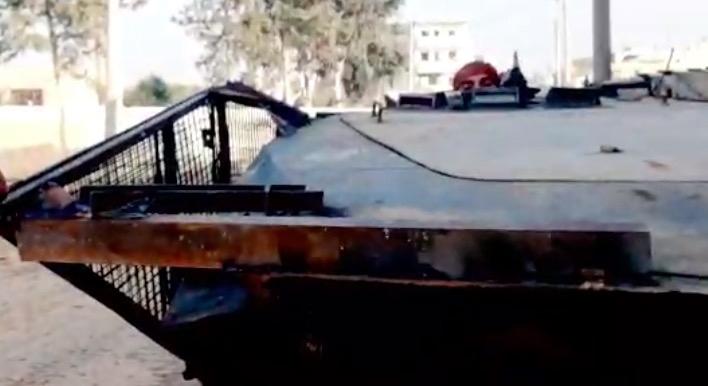
As loyalists continued advancing north from Saraqeb along the highway, opposition-held areas to the east collapsed, with an Iranian militia group even capturing an up-armored SVBIED left on the side of the road near Humeyra on Feb. 7. As loyalists began pushing northwest from the M5 into previously secure areas, HTS employed multiple SVBIEDs, fearing that the former was trying to divide Idlib into two pockets by reaching for the Turkish border. The initial SVBIED at al-Qammari next to the M5 on Feb. 9 was followed by a double SVBIED attack in nearby Miznaz the following day. The opening attack struck a tank, while the follow-up attack detonated close to a group of loyalist fighters examining the earlier blast site.
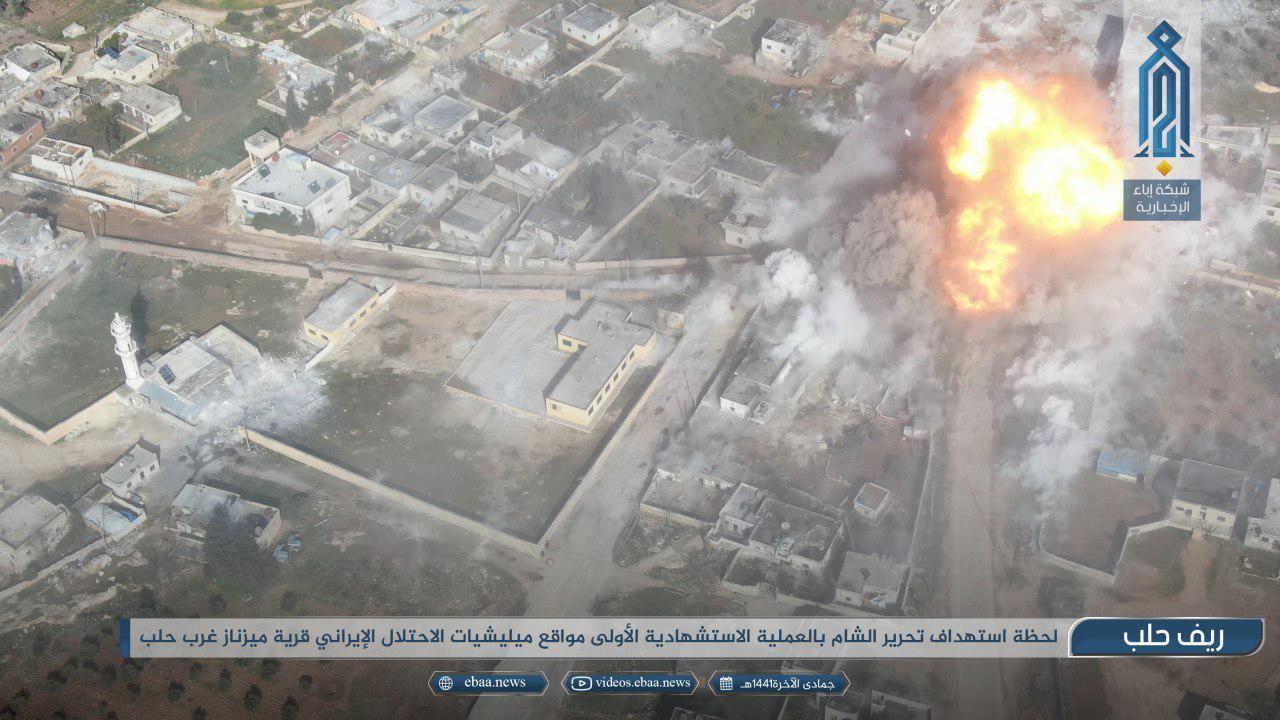
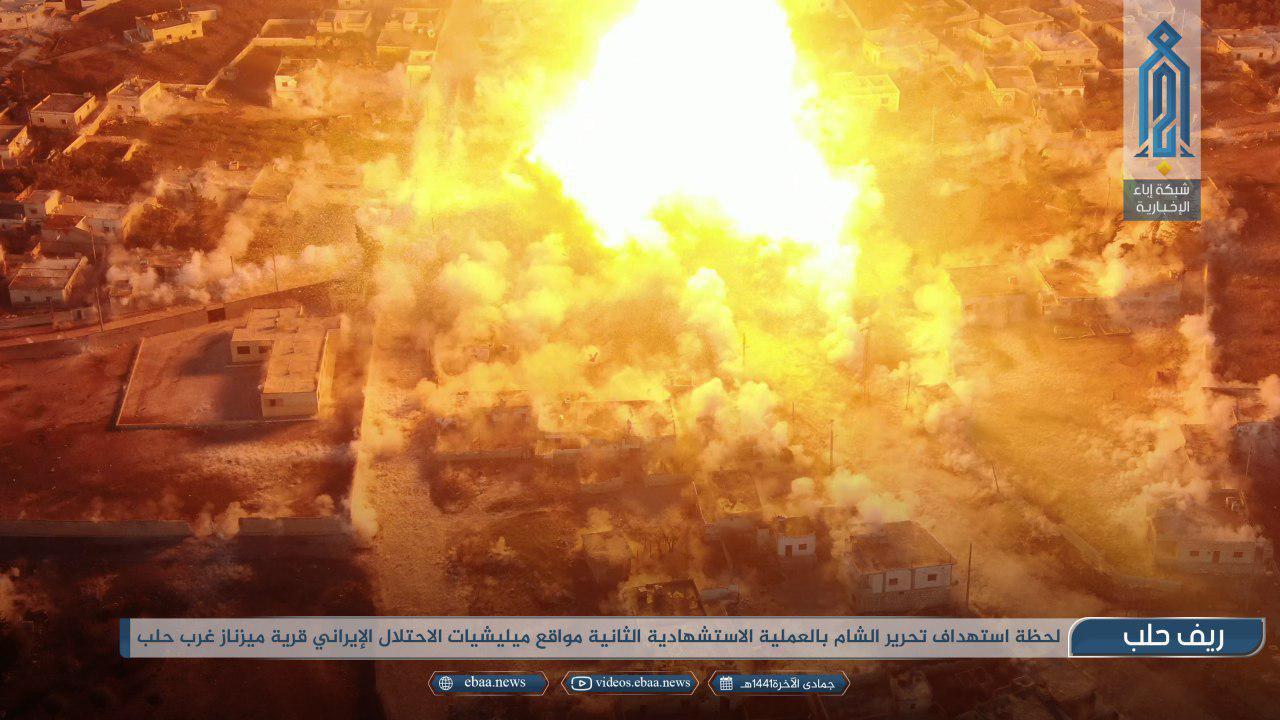
Since the beginning of the loyalist offensive the previous year, Turkish observation posts along the 2018 front lines had one after another become surrounded and isolated as the opposition’s territorial hold contracted.61 When loyalists approached strategic towns and villages, further observation posts were constructed,62 but they too failed at preventing advances and were surrounded as well. In February 2020, the Turkish Army began sending hundreds of tanks and armored vehicles, along with thousands of soldiers, across the border, in an effort to shore up the failing observation posts and prevent further loyalist advances.63 Loyalist forces grew bolder at the same time, and intentionally targeted Turkish convoys and outposts in early February,64 65 which in turn resulted in small-scale retaliatory air strikes by Turkey.66 Turkish President Recep Tayyip Erdogan also threatened loyalists with “direct military action” in the event of further Turkish casualties.67
Ostensibly under the cover of Turkish artillery fire, HTS would launch another SVBIED attack northeast of Miznaz near Sheikh Ali on Feb. 12.68 Four days later, the group detonated a BMP-1 SVBIED on a loyalist position in Khirbat Jazraya as well, just south of Miznaz.
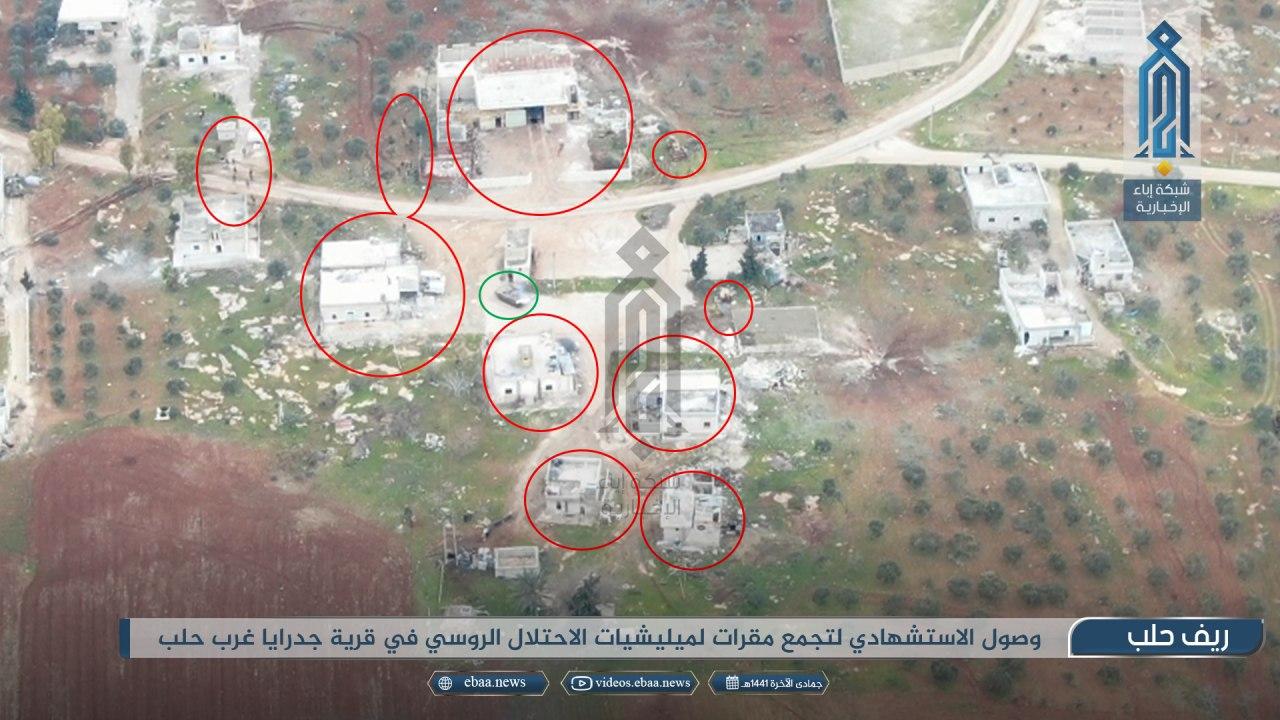
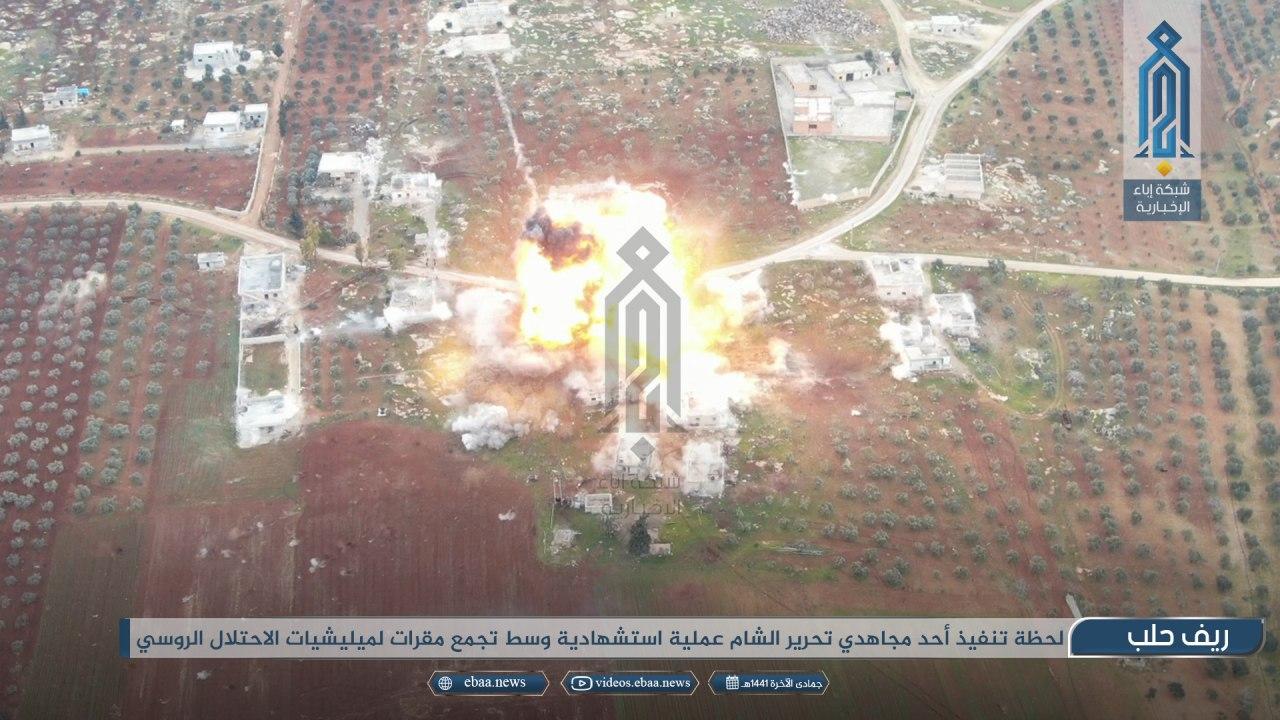
After having captured the entire M5 highway and all opposition-held areas east of it, loyalist forces turned their attention to Aleppo city’s western suburbs and countryside. Meeting surprisingly little resistance, HTS and other rebels were easily pushed out of the key strategic area by Feb. 17.69 A week later, the opposition’s territorial collapse continued. As HTS and other factions, aided by Turkish artillery support, commenced a renewed push to retake Saraqeb in the vicinity of Idlib city, loyalist forces began sweeping up the remaining opposition-held areas northeast of Kafr Nabudah in northern Hama, southern Idlib, and the al-Ghab plains. By Feb. 27, HTS and other rebels had managed to recapture Saraqeb, seizing more than a dozen armored vehicles in the process, while loyalist forces were able to sweep up another 20 villages, pushing the frontlines northeast of Kafr Nabudah further north and forming a rough line stretching westwards from Maarat al-Numan.70
In the afternoon of Feb. 27, the most pivotal event of the entire offensive took place. An airstrike hit a Turkish staging area near Balyun in southern Idlib’s Zawiyah Mountains, killing at least 34 Turkish soldiers.71 The attack was a severe escalation and prompted an immediate Turkish response. Using a fleet of armed drones and fighter jets, Turkey began systematically targeting loyalist positions along the frontline,72 while continuing artillery fire assisted HTS and other rebel forces on the ground.73 The increased Turkish support temporarily shifted the balance of power in favor of HTS and the opposition, who went on the offensive and recaptured some territory in the Zawiyah Mountains. While HTS and the other rebels continued advancing in the Zawiyah Mountains, Turkish fighter jets shot down two loyalist jets over Idlib on March 1.74
Building on their newfound momentum, HTS launched an SVBIED attack on the same day, targeting a loyalist position near Deir al-Kabirah in the Zawiyah Mountains. The attack was carried out by Katibat al-Tawhid wal-Jihad — a subgroup of HTS consisting of Uzbek foreign fighters — and footage of the SVBIED revealed a new variation of the group’s environment-specific design. Although the construction of the vehicle was identical to previous up-armored SVBIEDs used during the offensive, the paint scheme was different. Seeing as it was employed in the Zawiyah Mountains, a distinctively wooded area, the vehicle was given a green paint job that better corresponded to the operational surroundings of this specific target area. This illustrates a degree of versatility.
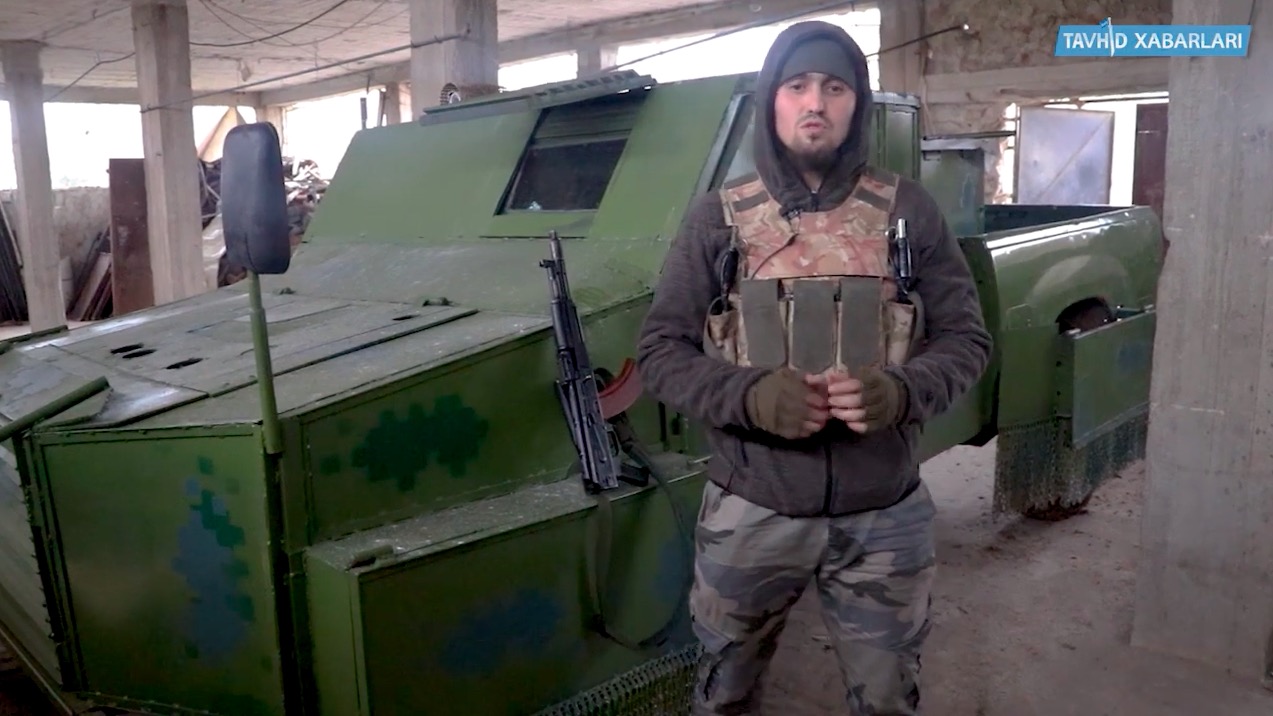
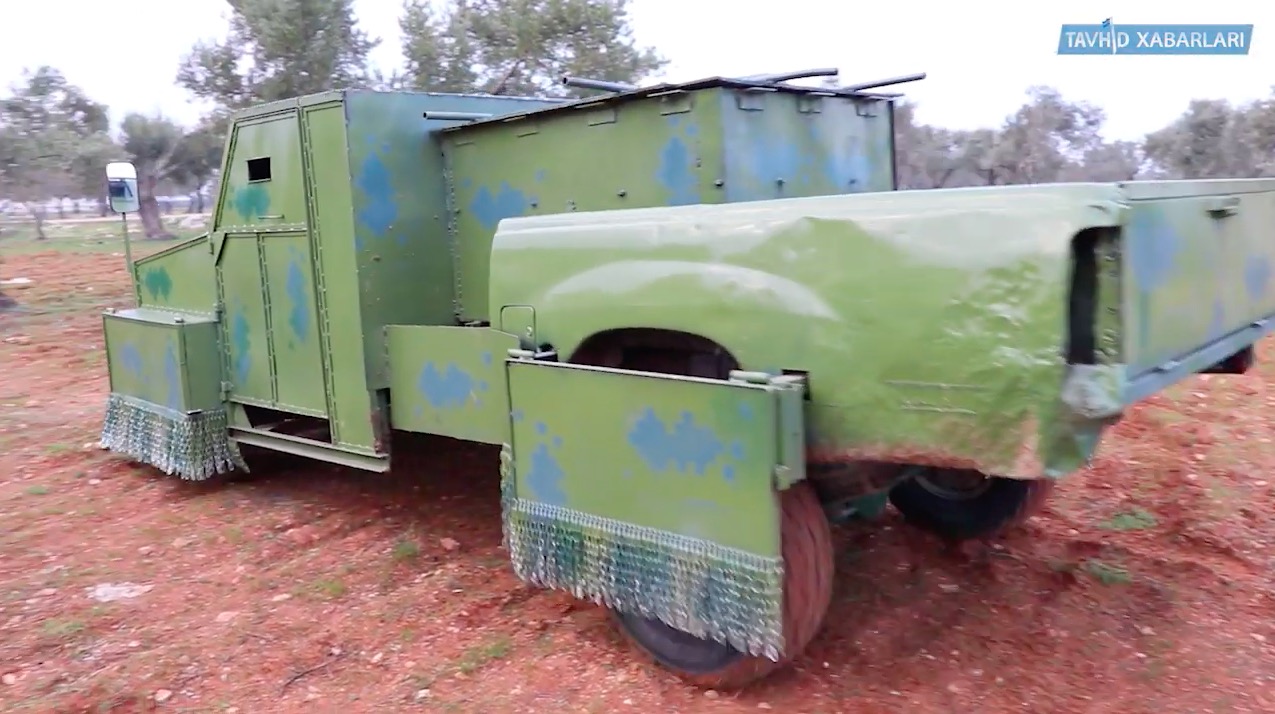
Turkey’s drone strikes had a devastating impact. In addition to destroying scores of loyalist armored vehicles, including at least two surface-to-air missile systems, and killing hundreds of loyalist fighters, loyalists also lost more than half a dozen aircraft.75 However, the newfound rebel momentum was short-lived. On March 2, loyalist forces were able to recapture Saraqeb.76 In the end, advances made by HTS and other rebel forces in the Zawiyah Mountains were limited in scope. Following high-level talks between the leaders of Turkey and Russia on March 5, another cease-fire was announced and later implemented.77 Monitoring the truce, joint Turkish-Russian convoys have since regularly patrolled a nominally “secure corridor” in opposition areas along the M4 highway since March 15.78 Four months later, on July 14, an SVBIED attack was carried out by a mysterious group calling itself “Kata’ib Khattab al-Shishani” against a joint patrol near Ariha, injuring a number of Russian and Turkish soldiers, momentarily disrupting the cease-fire.79
Despite HTS employing at least 35 SVBIEDs80 in the 10-month period between May 2019 and March 2020, the group and its allies lost at least 2,200 square kilometers of territory in greater Idlib Province, along with hundreds of villages and towns, amounting to 41 percent of the area formerly under their control.81 While many of the SVBIED attacks launched by HTS during this time achieved minor tactical victories — in the sense that they managed to abruptly halt rapid loyalist advances, sometimes even reversing hostile territorial gains — this was always limited in scope and short-lived. This was even more so than in preceding years, as opposition and ISIS territorial losses across Syria since 2016 facilitated loyalist mobilization across the Idlib frontlines.
The increased pressure exerted by the combined force of the Russian and loyalist air forces, coupled with the expanded ground deployment of the latter, in many cases reinforced the inability of HTS and other opposition factions to establish new fortifications after their original ones were captured, leading to withdrawals from large areas without notable resistance. Even when HTS committed significant resources to defending their territory, the use of SVBIEDs was massively insufficient. This power disparity was not altered substantially by the introduction of Turkish air power and artillery on the opposition’s side, as two-pronged attacks by loyalist forces often stretched rebel forces thin, preventing advances by the latter. Still, it is likely that HTS’s use of SVBIEDs slowed down the advance of loyalist forces, even if only moderately.
Looking at the overall statistics on HTS’s use of SVBIEDs during this offensive, it becomes quite clear the extent to which the group has transitioned to using them in a solely defensive manner. At least 22 (63 percent) of all SVBIEDs employed during this 11-month period were used in two months, August 2019 (10) and February 2020 (12). These months involved some of the heaviest territorial losses for HTS in Idlib, and it was then that SVBIEDs were employed the most as part of a concerted effort to slow down the group’s territorial losses. The other 13 SVBIEDs (37 percent) used during this time period were scattered over five months, and four months — July and September through November — did not see any SVBIEDs used at all. In a similar fashion, the geographical spread of the SVBIED attacks further illustrate the defensive posture of HTS, as attacks were successively conducted further north as time passed and the group’s territorial hold diminished.
"In the words of one of HTS’s suicide bombers, the use of SVBIEDs inflicts 'terror and horror in [the enemies’] hearts,' while at the same time 'lifting the morale' of fellow fighters."
Design and Development of Tactics, Techniques, and Procedures
The manufacturing of SVBIEDs within HTS is carried out by a network of facilities and workshops organized by the “department of war manufacturing”82 that also produces the group’s indigenous troop transport vehicles and technicals.83 Looking at the design and construction of the SVBIEDs used by HTS, the most apparent development in the past year has been the introduction of environment-specific paint schemes in an attempt to blend in with operational surroundings. Underneath the paint, the armor kits fitted to the standardized SVBIEDs used by HTS have successively been refined since the beginning of the 2019 offensive. According to the group itself, equipping the SVBIEDs with armor is the most important stage of the manufacturing process, and mounting the armor in a way that retains maneuverability and ensures the vehicle’s arrival to its target is key.84
For example, while the driver’s viewing port previously consisted only of a few slats cut out of the windshield armor, this was later replaced with a section of bulletproof glass, while the original armor slats could still be lowered on top for added protection. In an effort to better shield the vehicle’s tires, rows of steel chain sections were mounted in front of the vehicle’s frontal axle. Still, the general armor kit has remained roughly the same throughout the offensive. Out of all SVBIED attacks where the vehicle was visible, more than 75 percent used pick-up trucks, with the remainder made up of different BMP-1 variants. The focus on pick-up trucks likely facilitates the manufacturing of SVBIEDs, as standardized armor kits for identical vehicles are easier to produce en masse.
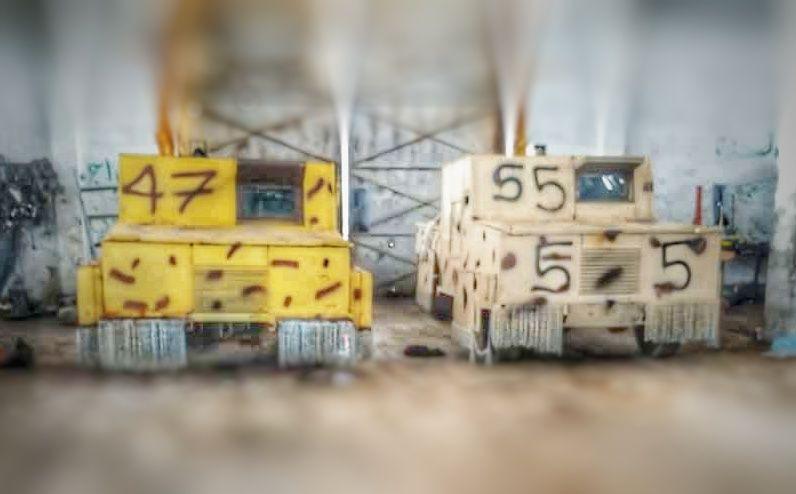
Equally, if not more, important has been the group’s heavy focus on navigation during SVBIED attacks. Beginning in 2012, HTS’s predecessor group JaN would regularly use satellite imagery in order to plan attacks and brief would-be bombers on their planned attack routes.85 This routine would continue, with the group refining it over the years. Starting sporadically in 2017, some SVBIEDs were equipped with touchscreen tablets next to the driver’s seat, that had the coordinates of the target site programmed into a satellite imagery app.86 This has subsequently become a standardized feature of most SVBIEDs used by the group since 2019.
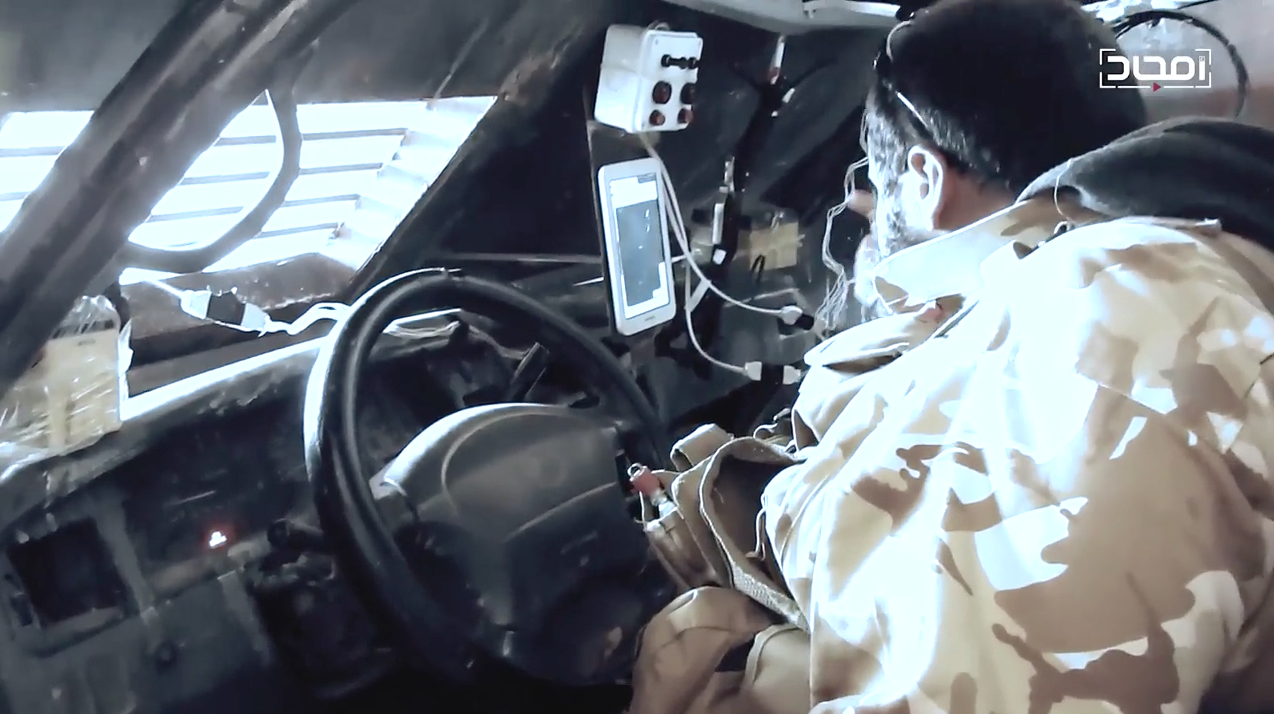
The focus on navigation has in rare instances been outlined by HTS personnel, one of whom proclaimed that “the first purpose of [the] operation is to get the [SVBIED] to the wanted target.”87 As part of this concerted effort, HTS has mimicked a tactic popularized by ISIS during the battle of Mosul. During the last year’s fighting, it became evident that HTS had established SVBIED support teams. When an SVBIED attack was called in, a support team would be assigned to it. Using quadcopter drones, they trailed and recorded the vehicle from above as it approached its target. During the entire time, the support team was in constant radio contact with the driver of the SVBIED, and was thus able to provide him with on-the-spot directions and guidance up until the point of detonation.
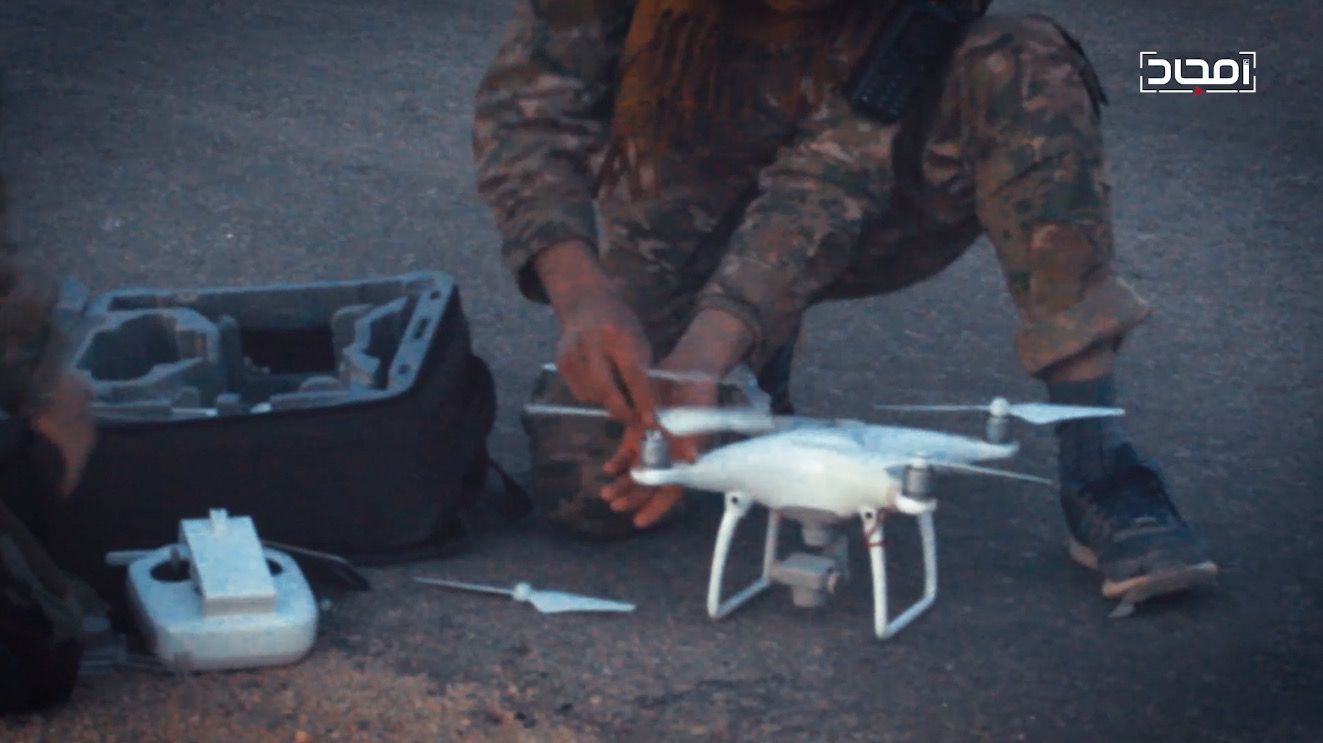
This was clearly evidenced on Feb. 7, 2020, when HTS released a short video showing an SVBIED detonating near Saraqeb the day before. In the background of the video, titled “guiding the martyr before reaching his target and detonating his car bomb,” members of the support team could be heard talking to the driver, named “Khattab al-Shamali,” as he advanced in his vehicle.88 After the driver announced he had passed a hostile vehicle and driven down a street, he exclaimed: “Give me directions!” The two members of the support team told the driver to keep straight ahead, to “continue to the west of the exit,” before ordering him “toward the cemetery and then to the houses.”89 Moments later the SVBIED detonated, and a fireball briefly lit up the sky.

Earlier on in the Syrian civil war, HTS’s predecessor group JaN would occasionally employ small numbers of remote-controlled vehicle-borne IEDs (RC-VBIEDs) in an offensive role. In order to be able to properly pilot these unmanned vehicles, the group would mount cameras to the front of the vehicles that assisted the operators through a live video feed.90
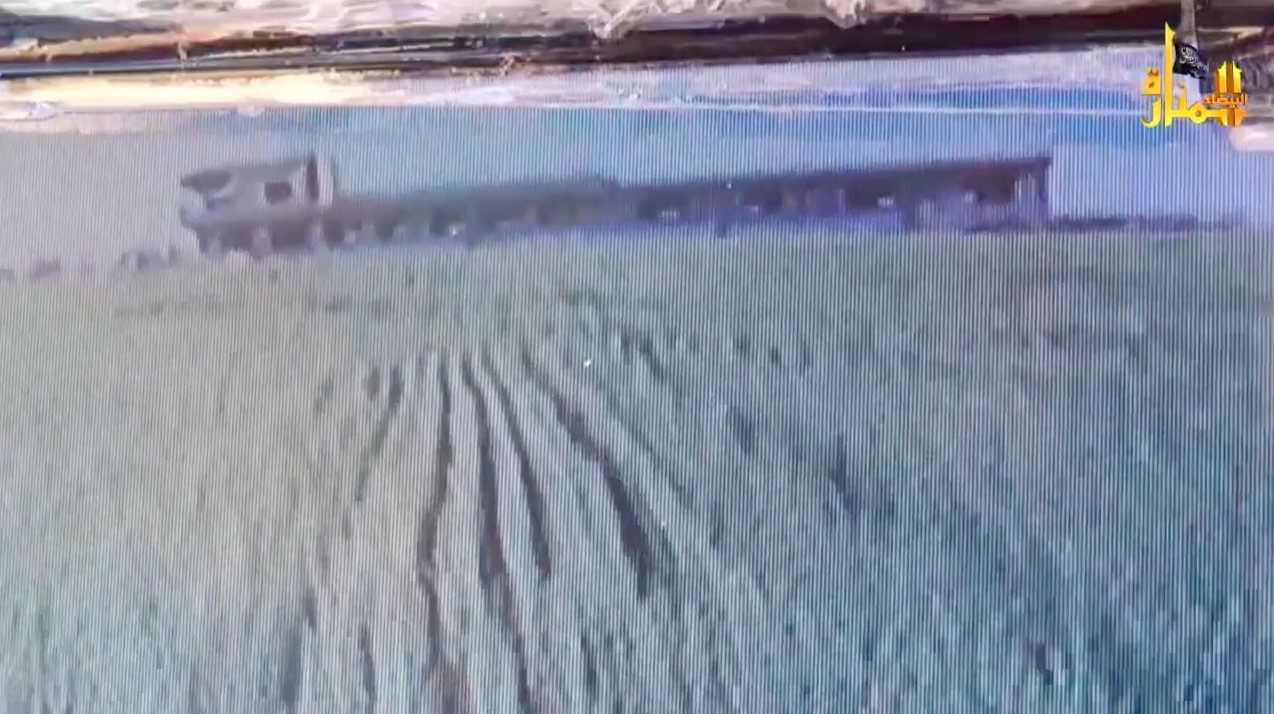
Since the beginning of the 2019 offensive, HTS started mounting similar forward-facing cameras on all of their SVBIEDs as well. In the first examples, a square hole for the camera would be cut out of the windshield armor.
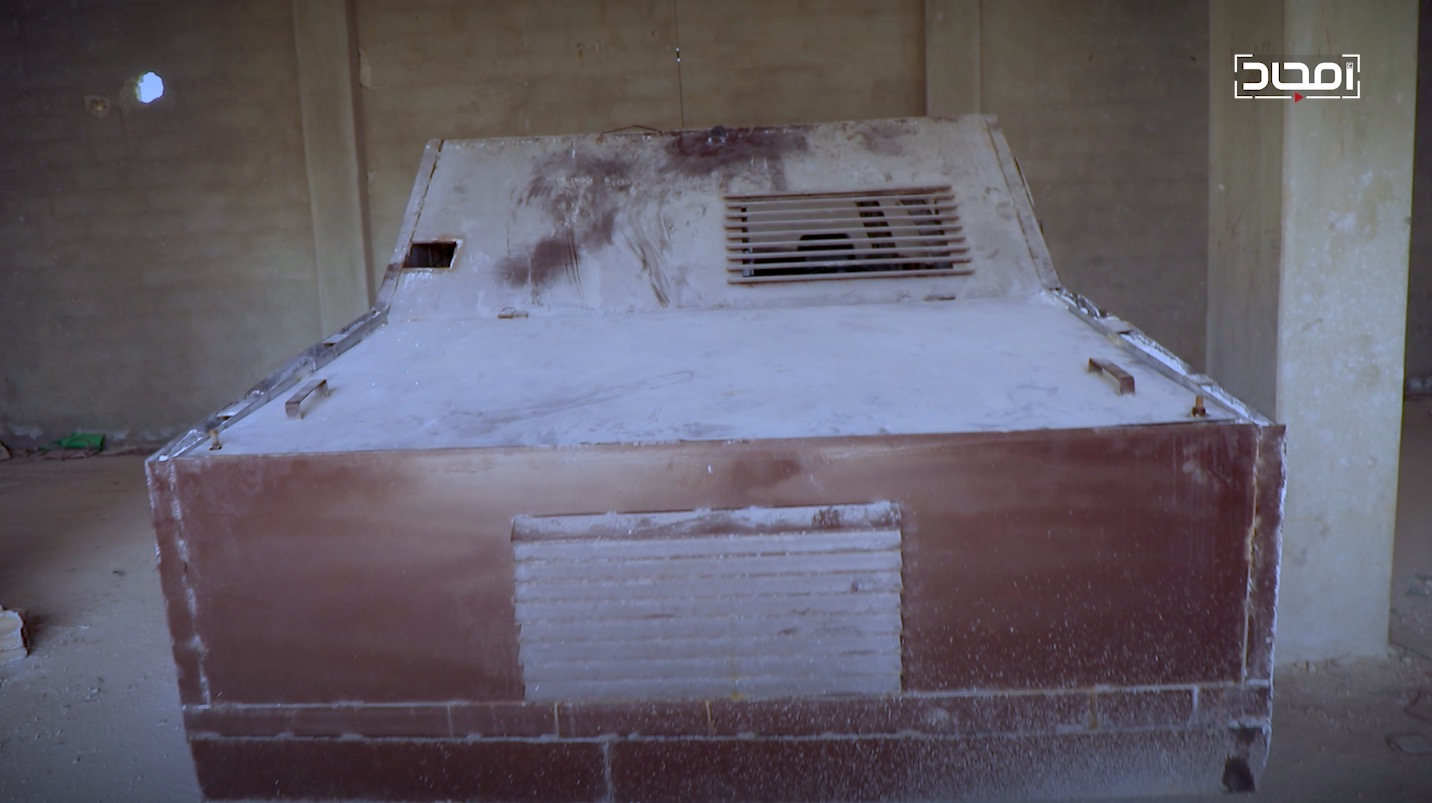
On the vast majority of all examples though, the cameras have been mounted on the roof of the driver’s cabin.
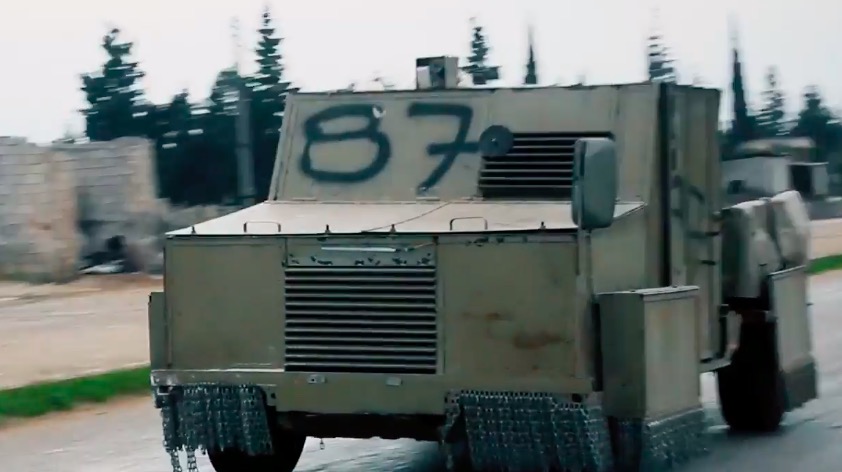
The cameras are connected to a live video feed on a tablet mounted to the interior of the driver’s cabin, and this serves a two-fold purpose. Firstly, if the vehicle comes under heavy hostile fire during an attack, the drivers are in some instances able to lower the driver’s extra windshield armor on top of the bulletproof glass and rely on the video feed instead. Secondly, and perhaps most importantly, the cameras are equipped with thermal or night vision capabilities, which facilitates nighttime operations.91 And while most attacks claimed by HTS in the past year have been carried out in broad daylight, the ability to effectively strike hostile positions in the dead of night offers the group a significant advantage. Recent unofficial imagery suggest that these cameras have begun appearing on some of the group’s indigenous troop transport vehicles as well.92
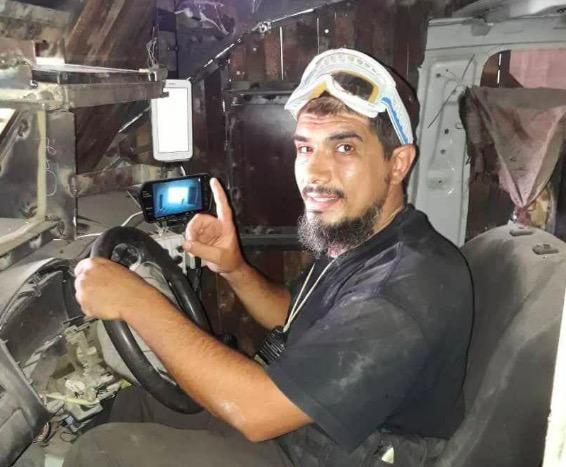
The imperative of making sure the SVBIEDs reach their intended targets also extends to ensuring the vehicles are able to detonate when they are supposed to. All SVBIEDs employed by HTS have utilized for many years a standardized detonation mechanism with multiple redundancies. The detonation mechanism is enclosed in a small white plastic box, and is similar in design to ones used extensively by ISIS in their SVBIEDs. The box consists of two sets of priming switches, lights, and firing switches. When the priming switch is flicked, the light is lit, indicating that the firing switch is activated. The two sets of switches are wired on separate firing circuits, in case faulty wiring renders one of them inoperable. The use of priming switches is intended to prevent accidental premature detonations by drivers with itchy trigger fingers.
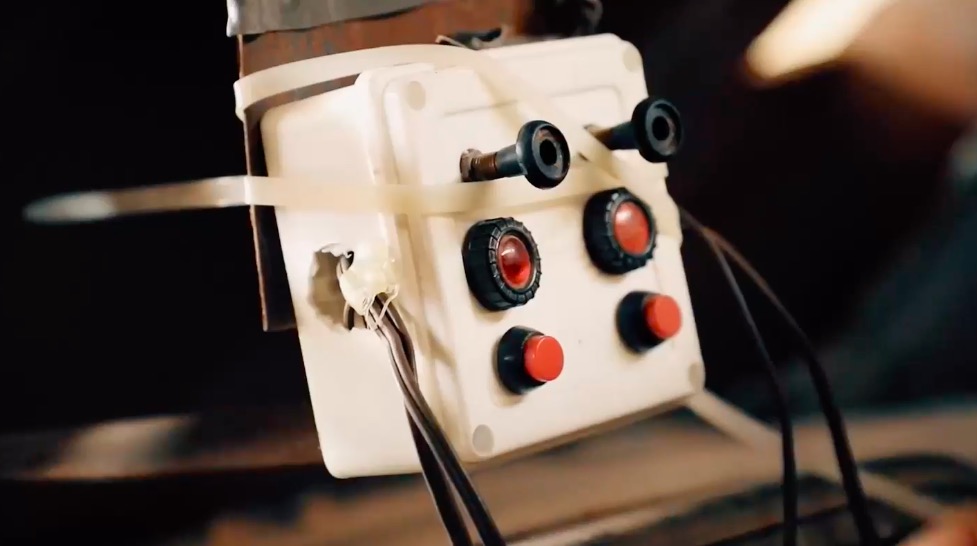
One new component present in all SVBIEDs with a visible interior since last year has been an improvised digital timer. The device, similarly encased in a white box, is comprised of a display and three different colored buttons, and is connected to the detonation mechanism. Though improvised, it closely resembles basic variants of digital timers, and can be used for two purposes. If the driver is able to reach the designated target without taking fire, he can park the vehicle, set the timer, and retreat far enough away from the vehicle so as to not be injured or killed in the resulting blast. This actually happened on Jan. 31, 2020, when an SVBIED driver was able to park his vehicle close to the target and escape unscathed. If the vehicle does come under heavy fire during its approach to the target, as is generally the case, the driver is able to set the timer so that it functions as a digital dead man’s switch, ensuring the vehicle will detonate when the time runs out regardless of whether the driver is injured or killed. Most SVBIEDs are already equipped with remote detonation capabilities,93 but the addition of a digital timer connected to the detonation mechanism would further guarantee successful detonations of the group’s SVBIEDs. On top of all this, and in case the vehicle still does not detonate, each driver is equipped with an assault rifle and an explosive belt as a last resort.
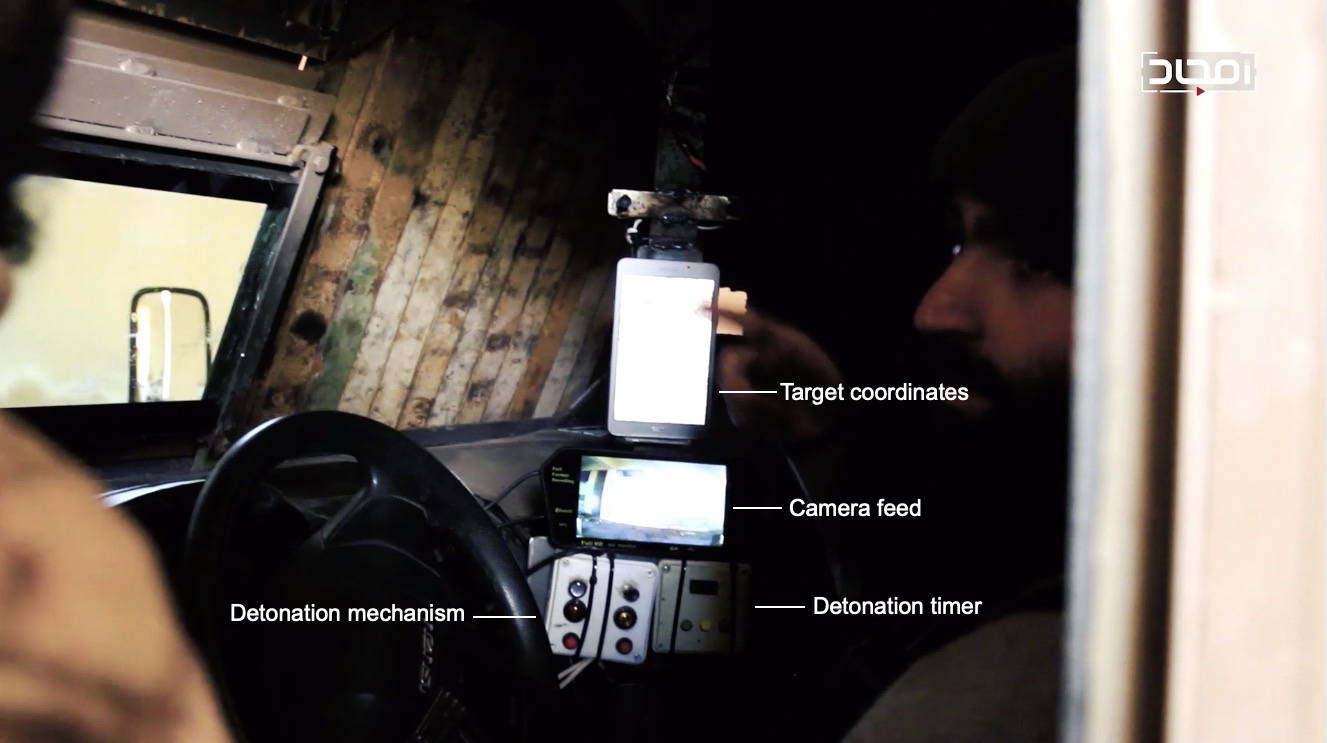
Just as other parts of the SVBIEDs used by HTS have changed and evolved, so too have the explosive charges fitted to the vehicles. Throughout the conflict, the group has utilized a number of different explosive components, ranging from artillery shells and anti-tank mines to unexploded ordnance and homemade explosives based on ammonium nitrate. However, ammonium nitrate explosives — placed in either plastic barrels or multi-purpose IEDs made from steel pipe sections — have been the most commonly used explosive charge in the group’s SVBIEDs since the early days of the war.94
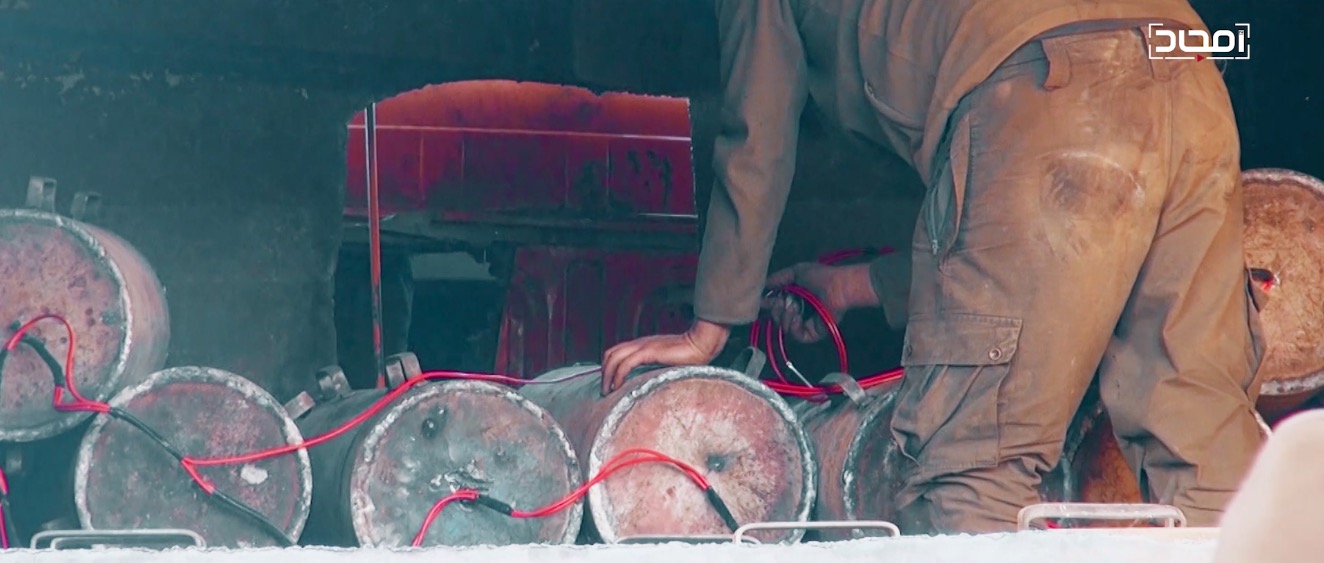
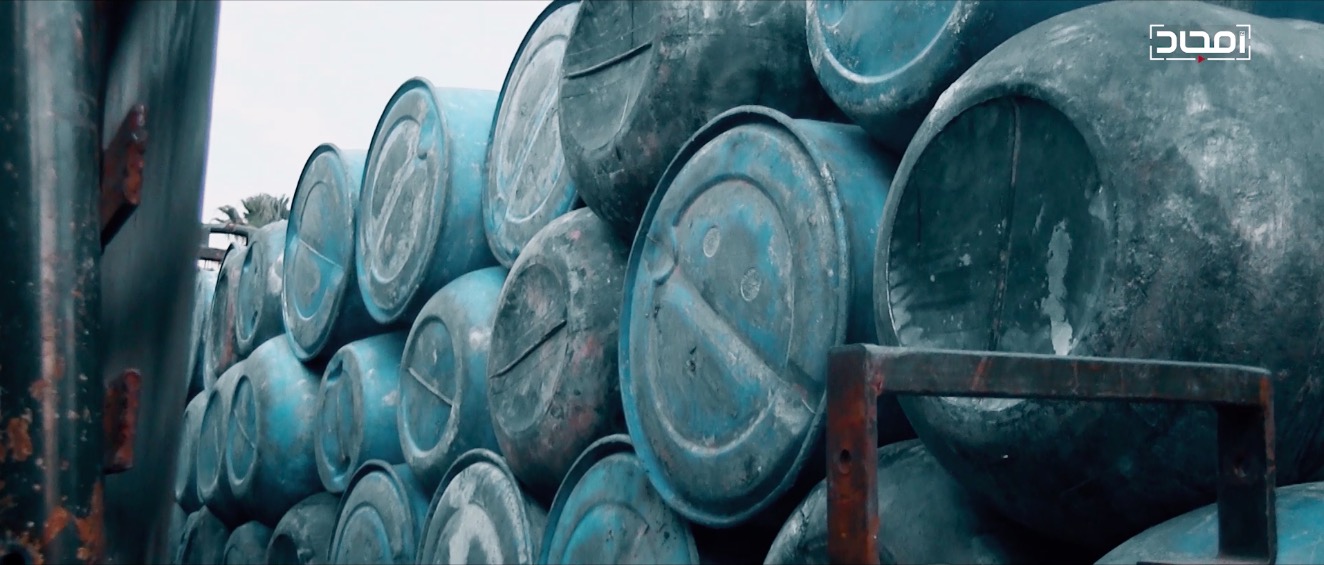
However, in December 2019 HTS claimed to have switched to using charges based on trinitrotoluene, or as it is more commonly known, TNT.95 While initially treated with suspicion, this claim was confirmed in another video published by pro-HTS media six months later in June 2020. In it, workers at an SVBIED workshop could be seen assembling the main explosive charge of one of the group’s recently constructed SVBIEDs. The charge consisted of at least 17 identical IEDs based on 10 liter olive oil aluminum canisters,96 some of which had what appeared to be leftover TNT residue on them.97
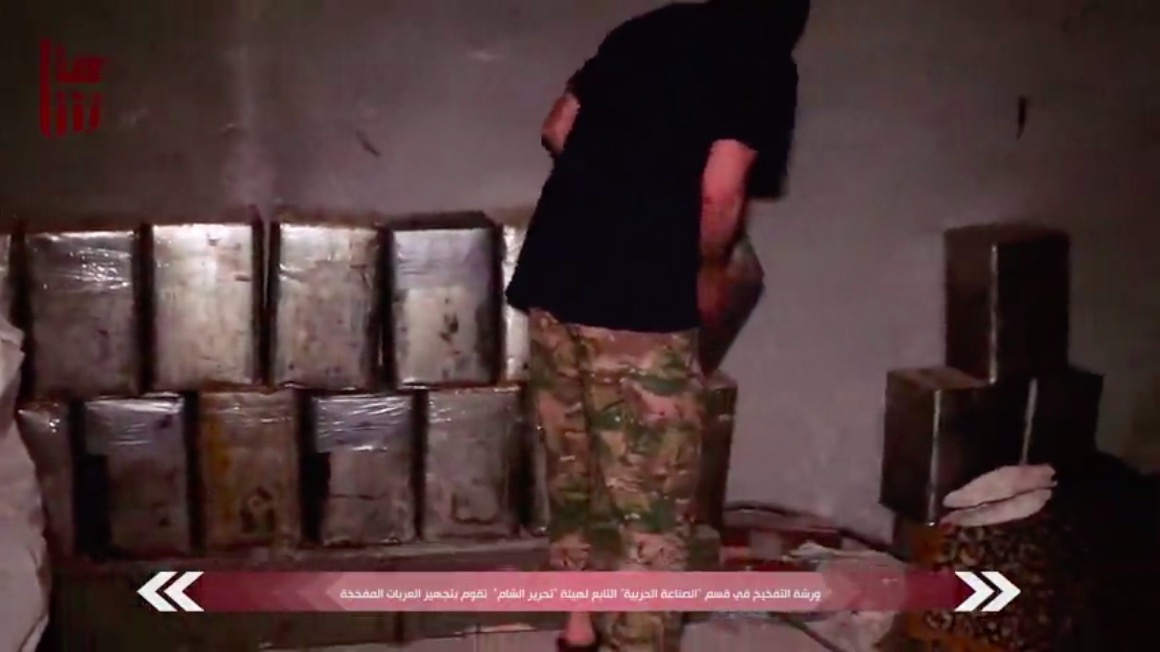
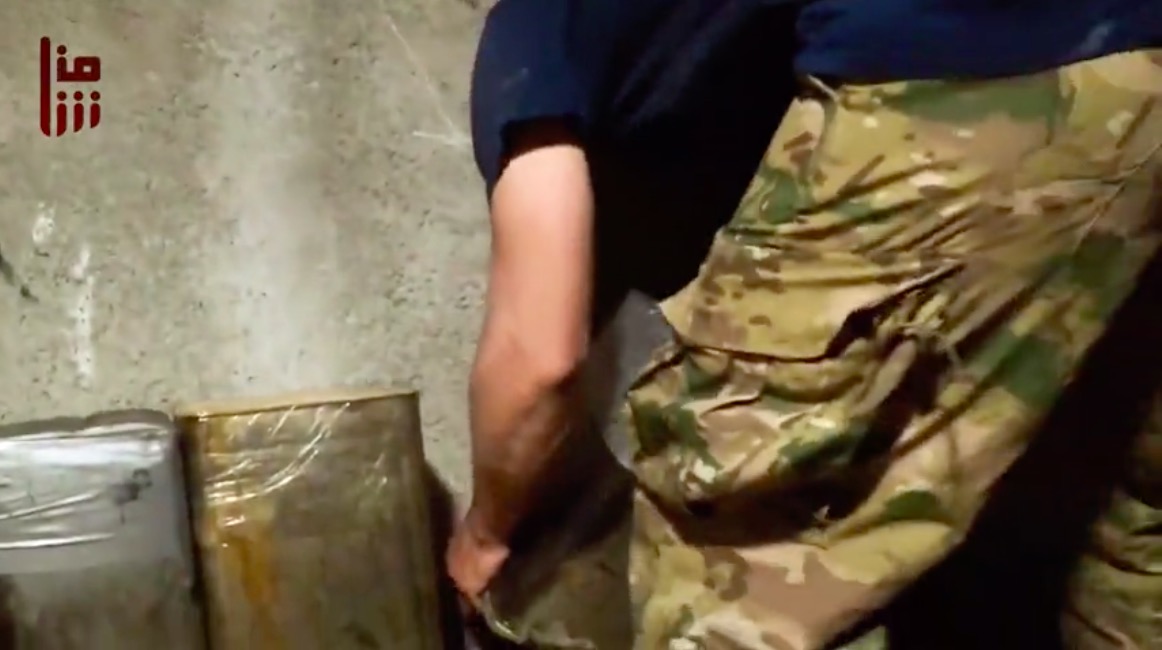
The TNT was likely melted and poured into the canisters to dry by workshop personnel. If completely filled, each individual IED would hold approximately 16.5 kilograms of TNT, resulting in an overall main charge consisting of at least 280 kilograms of TNT. TNT has a detonation velocity of 6900 meters/second (m/s), more than double that of explosives using ammonium nitrate, which detonate at a speed of 3400 m/s, making it a massive upgrade in terms of power.98 A main charge of hundreds of kilograms of TNT also has a far greater “brisance,” or breaking and shattering power, and has a sharper, though smaller, blast wave compared to ammonium nitrate charges.99
The IEDs were subsequently placed in a metal container fitted to the rear bed of the vehicle, and wired together using detonation cord. The container for the main charge was made up of two spaced metal sheets, with the void in between filled by steel rebar pieces and other small metal objects meant to serve as anti-personnel fragmentation upon detonation of the main charge. After the main charge is set, the container lid is sealed, which in turn amplifies the blast wave.
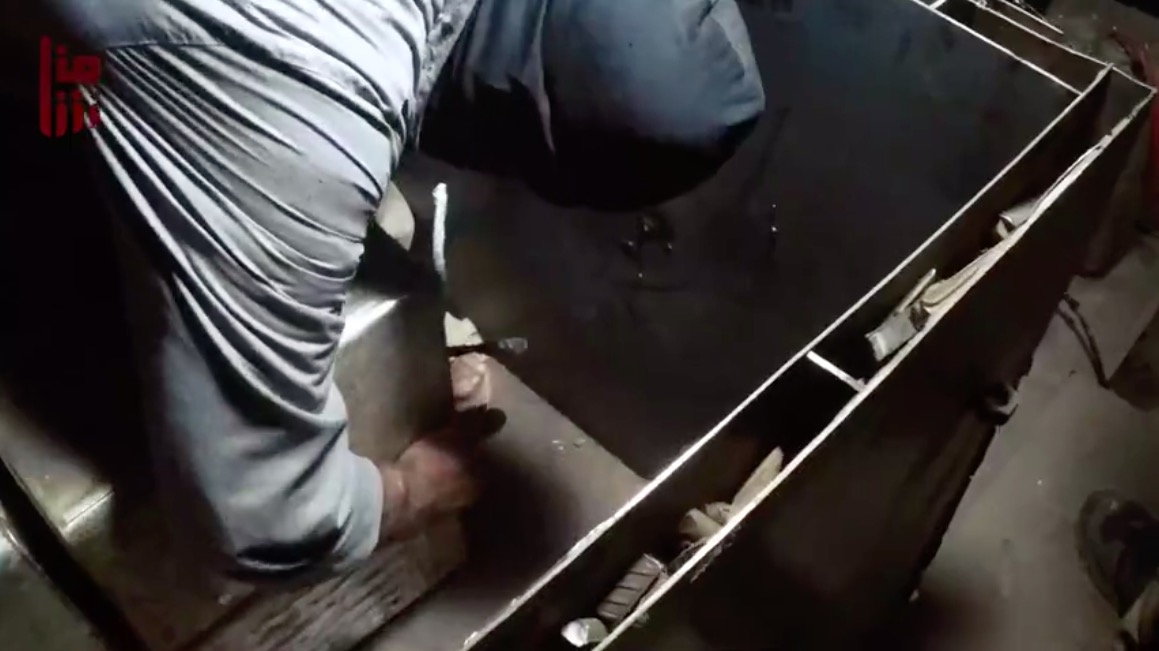
Looking at all the SVBIED attacks carried out by HTS since May 2019, a pattern is clearly visible. While the primary targets have been vehicle groupings in most cases, hostile military personnel are often treated as secondary targets. The updated main charge design of a more powerful explosive coupled with fragmentation is ideal for this strategy, as the explosives have a greater chance of destroying (armored) vehicles, while the added fragmentation increases the likelihood of casualties among nearby hostile military personnel.
Out of all SVBIED attacks claimed by HTS since May 2019, only about a third had pictures and names of the drivers published alongside them. The overwhelming majority of those had noms de guerre, clearly indicating they were natives, and in most cases locals of the areas in which they carried out their attacks. This went even further in some cases, such as the June 8, 2019 SVBIED attack south of Kafr Nabudah. The driver of that vehicle hailed from al-Mughayr village, located just 9 kilometers away from where he blew himself up. The use of hyperlocal drivers in this context makes perfect sense, as they are likely to be more motivated and intensely familiar with the target area, again facilitating navigation.

HTS regularly conducts recruitment campaigns to regenerate their ranks, and even allows prospective fighters to sign up online using apps such as WhatsApp and Telegram.100 Fighters wishing to become SVBIED drivers sign up for a waiting list, but the choice of who becomes a driver is rather arbitrary and not based on how long one has been on the list.101 102 As recently as June 2020, HTS updated the requirements for becoming an SVBIED driver. A statement issued by the group’s “department of martyrdom operations” stipulated that fighters wishing to become SVBIED drivers from then on were required join the elite Red Bands (al-Asaib al-Hamra) units prior to conducting an attack, and that future candidates had to be uninjured, in good physical condition, and unmarried.103
Astoundingly, this was followed in late September 2020 by claims from a source within HTS that the group’s leadership had decided to completely stop using SVBIED attacks.104 105 This was allegedly both due to the weapon’s inability to prevent loyalist advances during the most recent offensive, but also because of external pressure on the group to counter its image as a “terrorist” and “jihadist” group.106 Furthermore, the HTS source claimed that those still signed up on the SVBIED waiting list were to be transferred to the Red Bands unit instead.107 Although this tracked well with the June announcement, it was not confirmed by the group itself. Either way, the author remains skeptical of the authenticity of the claims.
"Although SVBIEDs can be an incredibly powerful weapon for non-state actors like HTS that can be utilized to great effect, their broader strategic impact depends to a large extent on the strength and readiness of the opponents against which they are being directed."
Conclusion
When discussing its own use of SVBIEDs, HTS presents it as a precise and lethal weapon, comparable to the “guided [air-to-ground] missiles” used en masse by the air forces of countries across the world.108 HTS also refers to previous attacks by other non-state actors in Afghanistan and Iraq, and the substantial “progress” (read: destruction) those yielded.109 Although SVBIEDs can be an incredibly powerful weapon for non-state actors like HTS that can be utilized to great effect, their broader strategic impact depends to a large extent on the strength and readiness of the opponents against which they are being directed. While the predecessor groups of HTS managed to acquire and hold territory earlier on in the conflict in large part due to the use of up-armored SVBIEDs in a more conventional battlefield setting, the group has been unable to do so in recent years — particularly in the past year — due to the balance of power tipping dramatically in favor of loyalist forces and their allies.
On the tactical level, HTS has made significant advances in the development of main charges, armor design, paint schemes, as well as the introduction of support teams, tablets with target coordinates, live camera feeds, and the new digital detonation timers. All of these have likely increased both the success rate of the group’s SVBIED attacks and the lethality of the resulting blasts. Further innovations in these areas are possible and even likely, as HTS themselves have declared that “[the SVBIED] keeps evolving, day after day.”110
However, seeing as HTS and other opposition factions have been unable to ward off the combined might of loyalist forces and their allies, the future of the remaining part of Idlib depends on the willingness of Turkey to engage loyalist forces militarily, should the latter commence a new offensive that threatens HTS’ continued control of the area. Regardless, HTS leader Abu Mohammed al-Jolani has indicated that the group is prepared for and anticipates a complete loss of territory and a return to insurgency, recently stating that his group had “moved past the idea of bringing down the regime,” instead reframing the group’s fight as a long-term struggle against a “Russian occupation.”111 Nevertheless, HTS is continuing to manufacture SVBIEDs as it foresees a resumption of fighting in the near future. The group is bound to continue their defense of Idlib in order to retain the little territory that remains under their control for as long as possible.
Endnotes
1. Reardon, Patrick, “Car bombs: ‘The poor man’s air force’,” Chicago Tribune, May 2, 2007, https://www.chicagotribune.com/news/ct-xpm-2007-05-02-0705010569-story…
2. Kaaman, Hugo, “The evolution of SVBIED deployment in Jabhat al-Nusra’s armed campaign 2011-2018,” Jane’s Terrorism & Insurgency Centre, December 2018.
3. Ibid.
4. Lister, Charles, “Profiling Jabhat al-Nusra,” Brookings Institute, July 2016, https://www.brookings.edu/wp-content/uploads/2016/07/iwr_20160728_profi…
5. Kaaman, Hugo, “The evolution of SVBIED deployment in Jabhat al-Nusra’s armed campaign 2011-2018,” Jane’s Terrorism & Insurgency Centre, December 2018.
6. Ibid.
7. Davis, Mike, “Buda’s Wagon: A brief history of the car bomb,” 2007, Verso.
8. Kaaman, Hugo, “The evolution of SVBIED deployment in Jabhat al-Nusra’s armed campaign 2011-2018,” Jane’s Terrorism & Insurgency Centre, December 2018.
9. Ibid.
10. Ibid.
11. Between January 2016 and September 2017, ISIS claimed to have carried out 1,352 SVBIED attacks, more than four times as many as Jabhat al-Nusra/Hayat Tahrir al-Sham have claimed during the entire Syrian civil war. https://hugokaaman.com/2018/08/18/islamic-state-statistics-on-its-svbie…
12. Kaaman, Hugo, “The evolution of SVBIED deployment in Jabhat al-Nusra’s armed campaign 2011-2018,” Jane’s Terrorism & Insurgency Centre, December 2018.
13. Kaaman, Hugo, “Car bombs as weapons of war: ISIS’s development of SVBIEDs, 2014-19,” Middle East Institute, https://www.mei.edu/sites/default/files/2019-04/Car_Bombs_as_Weapons_of_War_0.pdf.
14. Kaaman, Hugo, “The evolution of SVBIED deployment in Jabhat al-Nusra’s armed campaign 2011-2018,” Jane’s Terrorism & Insurgency Centre, December 2018.
15. “Syrian rebels capture Idlib city in joint offensive,” al-Jazeera, March 29, 2015, https://www.aljazeera.com/news/2015/03/syrian-rebels-capture-idlib-city….
16. Bassam, Laila and Tom Perry, “How Iranian general plotted out Syrian assault in Moscow,” Reuters, October 6, 2015, https://www.reuters.com/article/us-mideast-crisis-syria-soleimani-insig…
17. Kaaman, Hugo, “The evolution of SVBIED deployment in Jabhat al-Nusra’s armed campaign 2011-2018,” Jane’s Terrorism & Insurgency Centre, December 2018.
18. “Syria rebels ‘break government siege’ of Aleppo,” BBC News, August 7, 2016, https://www.bbc.com/news/world-middle-east-37000570.
19. Nassar, Alaa, Mohammad Abdulssattar Ibrahim, and Mateo Nelson, ”Search for the dead begins in Idlib after Islamic State-linked brigade leaves for Raqqah,” Syria Direct, February 22, 2017, http://syriadirect.org/news/search-for-the-dead-begins-in-idlib-after-i….
20. ”Syrian army, allies gain ground against rebels north of Hama,” Reuters, April 23, 2017, https://www.reuters.com/article/us-mideast-crisis-syria-hama/syrian-arm….
21. Joscelyn, Thomas, ”Al-Qaeda and allies announce ’new entity’ in Syria,” The Long War Journal, January 28, 2017, https://www.longwarjournal.org/archives/2017/01/al-qaeda-and-allies-ann….
22. Kaaman, Hugo, “The evolution of SVBIED deployment in Jabhat al-Nusra’s armed campaign 2011-2018,” Jane’s Terrorism & Insurgency Centre, December 2018.
23. Kaaman, Hugo, “The evolution of SVBIED deployment in Jabhat al-Nusra’s armed campaign 2011-2018,” Jane’s Terrorism & Insurgency Centre, December 2018.
24. ”Nusra Front, Islamic State clash in Syria’s Hama province,” Reuters, October 9, 2017, https://www.reuters.com/article/us-mideast-crisis-syria-islamic-state/n….
25. Kaaman, Hugo, “The evolution of SVBIED deployment in Jabhat al-Nusra’s armed campaign 2011-2018,” Jane’s Terrorism & Insurgency Centre, December 2018.
26. “Syria: ‘Surrender or starve’ strategy displacing thousands amounts to crimes against humanity,” Amnesty International, November 13, 2017, https://www.amnesty.org/en/latest/news/2017/11/syria-surrender-or-starv….
27. ”Syrian army captures Wadi Barada near Damascus,” Al-Jazeera, January 29, 2017, https://www.aljazeera.com/news/2017/01/syrian-army-captures-wadi-barada….
28. ”Two years under siege, and it ends with displacement,” Al-Jazeera, April 14, 2017, https://www.aljazeera.com/news/2017/04/exchange-residents-begins-evacua….
29. Evacuation of rebels begin in Barzeh,” Al-Jazeera, May 8, 2017, https://www.aljazeera.com/news/2017/05/evacuation-syrian-rebels-starts-….
30. “Syrian army enters eastern Qalamoun after full evacuation of rebels,” Xinhua, April 26, 2018, http://www.xinhuanet.com/english/2018-04/26/c_137137014.htm.
31. "Syrian government forces seize last rebel enclave in Homs,” AP News, May 15, 2018, https://apnews.com/b4e07860193041629ab2b9c9fcc69aca/Syrian-government-f….
32. Ahmado, Nisan, ”Syrian Government, Rebels Reach Evacuation Agreement for S. Damascus”, VOA News, April 30, 2018, https://www.voanews.com/a/syria-government-rebels-evacuation-agreement-….
33. Barrington, Lisa, ”Syrian army celebrates as rebels quit most of their Ghouta stronghold,” Reuters, March 23, 2018, https://www.reuters.com/article/us-mideast-crisis-syria-ghouta/syrian-a…
34. “Deraa, birthplace of Syria uprising, retaken by government forces,” BBC News, July 12, 2018, https://www.bbc.com/news/world-middle-east-44806045.
35. ”Turkey finishes setting up observation posts in Idlib,” Hurriyet, May 16, 2018, http://www.hurriyetdailynews.com/turkey-finishes-setting-up-observation….
36. “Syria war: Russia and Turkey to create buffer zone in Idlib,” BBC News, September 17, 2018, https://www.bbc.com/news/world-middle-east-45554188.
37. Haynes, Danielle, “Russia, Turkey extend deadline to clear Syria’s demilitarized zone,” UPI, October 18, 2018, https://www.upi.com/Top_News/World-News/2018/10/18/Russia-Turkey-extend….
38. Al-Khalidi, Suleiman, “Syrian rebels say goal of Russia’s Idlib assault is to take highways,” Reuters, May 5, 2019, https://uk.reuters.com/article/uk-syria-security-idlib-idUKKCN1SC00Z.
39. “Syria war: UN alarm at escalation of hostilities in Idlib,” BBC News, May 7, 2019, https://www.bbc.com/news/world-middle-east-48185517.
40. “Dozens killed as rebels launch counterattack in Syria,” al-Jazeera, May 21, 2019, https://www.aljazeera.com/news/2019/05/dozens-killed-rebels-launch-coun…
41. https://twitter.com/GerardsScw/status/1281291485602668544
42. https://twitter.com/john_marquee/status/1281285156926451713
43. Kotan, Bilge Nesibe, “Civilians hopeful after Syrian rebels recapture territory from regime,” TRT World, May 24, 2019, https://www.trtworld.com/middle-east/civilians-hopeful-after-syrian-reb….
44. “Syrian troops regain control of village they lost to rebels,” AP News, May 26, 2019, https://apnews.com/2844b0ef47dd49f0a2700f73327ef1ed.
45. Assessment based on satellite imagery showing the SVBIED appearing on May 12 and disappearing after May 26, 2019.
46. Brown, Jonathan, “Air strikes intensify in Idlib, Syrian rebels say,” The National, July 30, 2019, https://www.thenational.ae/world/mena/air-strikes-intensify-in-idlib-sy….
47. “Syrian government forces recover area in northwest,” Reuters, July 29, 2019, https://uk.reuters.com/article/uk-syria-security-idUKKCN1UO16C.
48. “Syrian troops push closer to rebel-held northwest town,” AP News, July 29, 2019, https://apnews.com/4756ffe8abac4f3b9a8cb0f55ac9b74b.
49. 11.5 kilometers in a straight line, not accounting for the system of roads.
50. Kaaman, Hugo, “Car Bombs As Weapons of War: ISIS’s Development of SVBIEDs, 2014-19,” Middle East Institute, April 10, 2019, https://www.mei.edu/publications/car-bombs-weapons-war-isiss-developmen….
51. Ebaa News weekly newspaper #62, published on August 18, 2019, https://ebaa.news/wp-content/uploads/2019/08/صحيفة-إباء-الأسبوعية-العدد….
52. “Khan Sheikhoun: Syria rebels pull out of key town after five years,” BBC News, August 20, 2019, https://www.bbc.com/news/world-middle-east-49404741.
53. Francis, Ellen, “Syrian army takes towns in northwest that rebels held for years,” Reuters, August 23, 2019, https://www.reuters.com/article/us-syria-security-northwest-idUSKCN1VD0….
54. “Regime Presses On In Northwest Syria,” Asharq al-Awsat, August 29, 2019, https://english.aawsat.com//home/article/1877806/regime-presses-northwe….
55. “Syrian army to cease fire in Idlib de-escalation zone on Aug. 31: TASS,” Reuters, August 30, 2019, https://www.reuters.com/article/us-syria-security-ceasefire-idUSKCN1VK1….
56. “"اختر سلاحك (2) المفخخة", Amjad Media - https://amjad.media/cyw-vbied/ (translated by Elie Asmar)
57. “"اختر سلاحك (2) المفخخة", Amjad Media - https://amjad.media/cyw-vbied/ (translated by Elie Asmar)
58. McKernan, Bethan, “Assad regime captures town in Syria’s last rebel-held territory,” The Guardian, January 28, 2020, https://www.theguardian.com/world/2020/jan/28/syrian-regime-captures-ma….
59. McKernan, Bethan, “Assad regime captures town in Syria’s last rebel-held territory,” The Guardian, January 28, 2020, https://www.theguardian.com/world/2020/jan/28/syrian-regime-captures-ma…
60. Ashawi, Khalil and Tom Perry, “Jihadist car bomb attacks target Syrian pro-government forces in Aleppo,” Reuters, February 1, 2020, https://www.reuters.com/article/us-syria-security-idUSKBN1ZV3I1.
61. “Syria regime forces surround Turkish army post in Idlib,” France24, December 23, 2019, https://www.france24.com/en/20191223-syria-regime-forces-surround-turki….
62. “Turkey sets up new military observation post in rural Idlib,” Enab Baladi, January 28, 2020, https://english.enabbaladi.net/archives/2020/01/turkey-sets-up-new-mili….
63. “Syria: Assad’s forces ‘seize’ crossroad town as Turkey sends convoy into Idlib,” DW, February 8, 2020, https://www.dw.com/en/syria-assads-forces-seize-crossroad-town-as-turke…
64. McKernan, Bethan, “Turkish soldiers killed as battle for control of Idlib escalates,” The Guardian, February 3, 2020, https://www.theguardian.com/world/2020/feb/03/turkish-soldiers-killed-b….
65. “Syria war: Government shellfire kills Turkish soldiers in Idlib,” BBC News, February 10, 2020, https://www.bbc.com/news/world-middle-east-51447114.
66. Gall, Carlotta, “Turkey Launches Deadly Airstrikes Against Syrian Forces,” New York Times, February 3, 2020, https://www.nytimes.com/2020/02/03/world/middleeast/turkey-syria-idlib….
67. McKernan, Bethan, “Erdogan threatens Assad with retaliation if more troops harmed,” The Guardian, February 12, 2020, https://www.theguardian.com/world/2020/feb/12/erdogan-threatens-assad-w….
68. https://twitter.com/huseyinbozan/status/1227607014609760256?s=20
69. “Syrian forces seize most of Aleppo province, on eve of Turkey-Russia talks,” NBC News, February 17, 2020, https://www.nbcnews.com/news/world/syrian-forces-seize-most-aleppo-prov….
70. McKernan, Bethan, “Syrian rebels retake key town in Idlib from Assad forces,” The Guardian, February 27, 2020, https://www.theguardian.com/world/2020/feb/27/syrian-rebels-retake-key-….
71. Tuysuz, Gul and Isil Sariyuce, “At least 33 Turkish soldiers killed in an air attack by Syrian regime, Turkish governor says,” CNN, February 28, 2020, https://edition.cnn.com/2020/02/27/middleeast/turkish-soldiers-killed-s….
72. “The Idlib Turkey Shoot: The Destruction and Capture of Vehicles and Equipment by Turkish and Rebel forces,” Oryx Blog, February 28, 2020, https://www.oryxspioenkop.com/2020/02/the-idlib-turkey-shoot-destructio…
73. Roblin, Sebastien, “Turkish Drones and Artillery Are Devastating Assad’s Forces in Idlib Province – Here’s Why”, Forbes, March 2, 2020, https://www.forbes.com/sites/sebastienroblin/2020/03/02/idlib-onslaught….
74. Kucukgocmen, Ali and Ellen Francis, “Turkey strikes Syrian planes and airports, escalating Idlib fight,” Reuters, March 1, 2020, https://uk.reuters.com/article/uk-syria-security-turkey-idUKKBN20O1KP.
75. “The Idlib Turkey Shoot: The Destruction and Capture of Vehicles and Equipment by Turkish and Rebel forces”, Oryx Blog, February 28, 2020, https://www.oryxspioenkop.com/2020/02/the-idlib-turkey-shoot-destructio….
76. Mroue, Bassem, “Turkey’s Erdogan hopes to broker Syria truce in Moscow,” AP News, March 2, 2020, https://apnews.com/75cfdf548c889c4d946027eda1e23fdb.
77. Soldatkin, Vladimir and Maria Kiselyova, “Russia, Turkey agree ceasefire deal for Syria’s Idlib,” Reuters, March 5, 2020, https://www.reuters.com/article/us-syria-security-idUSKBN20S161.
78. “Joint Turkish-Russian patrols to begin on March 15 – latest updates,” TRT World, March 7, 2020, https://www.trtworld.com/middle-east/joint-turkish-russian-patrols-to-b….
79. “Russian, Turkish troops wounded in attack on Syria joint patrol,” al-Jazeera, July 14, 2020, https://www.aljazeera.com/news/2020/07/russian-turkish-troops-wounded-a….
80. The group itself claims to have carried out 32 attacks, but at least 35 have been documented if one counts failed attacks as well.
81. https://twitter.com/OffbeatResearch/status/1230281378547339264/photo/1
82. Al-Shamna media video release, published on June 9, 2020.
83. Identical armor kits and paint schemes have been observed on some troop transport vehicles and SVBIEDs.
84. “"اختر سلاحك (2) المفخخة", Amjad Media - https://amjad.media/cyw-vbied/ (translated by Elie Asmar)
85. Kaaman, Hugo, “The evolution of SVBIED deployment in Jabhat al-Nusra’s armed campaign 2011-2018,” Jane’s Terrorism & Insurgency Centre, December 2018.
86. Ibid.
87. “"اختر سلاحك (2) المفخخة", Amjad Media - https://amjad.media/cyw-vbied/ (translated by Elie Asmar)
88. “توجيه الاستشهادي قبل وصوله هدفه وتفجير عربته المفخخة”, Ebaa News - https://videos.ebaa.news/watch/6HaT5OvVhamptrf - translated by Elie Asmar
89. Ibid.
90. Kaaman, Hugo, “The Myth of the Remote-Controlled Car Bomb,” EE Radicalization, September 2019, https://eeradicalization.com/wp-content/uploads/2019/09/Hugo-Report-Rem….
91. Interviews with multiple HTS members.
92. https://twitter.com/CalibreObscura/status/1283354621310795777?s=20
93. Kaaman, Hugo, “The evolution of SVBIED deployment in Jabhat al-Nusra’s armed campaign 2011-2018,” Jane’s Terrorism & Insurgency Centre, December 2018.
94. Kaaman, Hugo, “The evolution of SVBIED deployment in Jabhat al-Nusra’s armed campaign 2011-2018,” Jane’s Terrorism & Insurgency Centre, December 2018.
95. “"اختر سلاحك (2) المفخخة", Amjad Media - https://amjad.media/cyw-vbied/ (translated by Elie Asmar)
96. https://twitter.com/Tahsin00198867/status/1270720197079363596?s=20
97. Interview with Chris Weakly, former EOD tech.
98. Interview with Scott Stewart
99. Ibid.
100. Al-Tamimi, Aymenn Jawad, “Idlib and its Environs: Narrowing Prospects for a Rebel Holdout,” Washington Institute, February 2020, https://www.washingtoninstitute.org/uploads/Documents/pubs/PolicyNote75….
101. Interviews with multiple HTS fighters.
102. “Dugma: The Button,” Paul Refsdal (2016).
103. Interviews with multiple HTS fighters and analysts.
104. Ibid.
105. https://twitter.com/OAjjoub/status/1308775122095034369?s=20
106. https://www.syria.tv/تحرير-الشام-تتخلى-عن-أقوى-أسلحتها-وتعيد-هيكلة-قواتها-في-12-لواء
107. Ibid
108. Ibid.
109. “"اختر سلاحك (2) المفخخة", Amjad Media - https://amjad.media/cyw-vbied/ (translated by Elie Asmar)
110. Ibid.
111. https://twitter.com/hxhassan/status/1209614616810205185?s=20
About the Author
Hugo Kaaman is an independent open-source researcher, with a heavy focus on the use of Suicide Vehicle-Borne Improvised Explosive Devices (SVBIEDs) by armed non-state actors – specifically ISIS. For the past few years he has researched and written in-depth about the evolving nature of the group’s use of SVBIEDs, and how it has been transformed and adapted through a series of innovations.
Hugo was a speaker at the 2019 Security and Counter Terrorism Expo, and has researched and written for publications such as Jane’s Military & Security Assessments Intelligence Centre.











